#but its an interesting concept to explore some of the darker aspects of his personality
Text
it all feels the same with your eyes closed (deep end, part 1)
A/N: This mini series needs a content warning for suicidal ideation, domestic violence, and excessive alcohol consumption. (I told y’all I was gonna throw some angst at ya.)
Things had been tense around base since the return of Task Force 141 after an unsuccessful mission. Mistakes had been made, resulting in the loss of personnel and vital intel.
The main core personnel of the Task Force were currently in a meeting, discussing information for an upcoming mission. The meeting was already tense, but it escalated as Simon and Juliana were arguing back and forth about protocols.
“I AM YOUR SUPERIOR OFFICER. I’M THE ONE IN CHARGE HERE.” Simon yells at Juliana before backhanding her across the face so hard that she stumbles back.
The room goes silent, shock spreading among everyone as they stare at the couple.
Simon throws a vicious glare at Juliana before spitting out the final piece of the argument. “Get the fuck out of my sight.”
She doesn’t bother to grab her things before sprinting out of the room.
Simon stares at the door she left through for a brief second, before turning to the rest of the room. Tensions were high, but he was trying to remain calm after his outburst. “I’m sorry you had to witness that. I’ll handle this. We’ll continue later.” He says gruffly.
He sighed internally. What was she so upset about anyway? Simon doesn’t like fighting with her, but lately it’s been happening more and more.
“Witness that? Simon, you just hit your girlfriend, not to mention you just assaulted a fellow soldier, IN FRONT OF WITNESSES.” Captain Price roars.
Simon flinches at Price’s reaction, and tries to defend his actions without being rude. “I wouldn’t have hit her without reason. I had to do what I did. It’s not like I’m proud of it. I’ll handle it, and apologize to her personally.”
“Good luck getting her to hold still long enough to do that.” Soap mutters under his breath.
“Soap!” Simon whirls on Johnny, glaring at him intensely. “Are you insinuating what I think you are right now?”
“It depends, sir,” Soap addressed him mockingly. “What is it you think I’m insinuating?”
Simon’s voice became harsh, as he spoke quickly. “I want a straight answer, Soap. Are you implying that she’s going to be so furious, that she’s going to fight me?”
“I’m implying, sir,” Soap mocks again, “That you’ll be hard pressed to even find her and get her to listen long enough for you to say the words ‘I’m sorry’, without her bolting. There’s a reason we call her Bambi.”
Simon sighed, he knew Johnny was right. She would disappear the minute she saw him. He had to do something.
His mind raced, trying to think of a plan. He didn’t know where she’d run off to, he just knew she was angry. Very angry.
“I’ll find her. I’ll make sure she hears me out.” Simon huffs.
“You’d better get this sorted out, and fast Simon. We’re getting deployed again in a few weeks, and we need this team 100% together.” Captain Price says sternly.
Simon nods, still pissed that this even became a fight in the first place. “She’ll come around. I’ll make sure of it.”
He then turns to Johnny and Kyle. “You two keep your mouths shut about this. Especially you, Soap. We don’t need anymore drama. Are we clear?”
Johnny looks him squarely in the eye. “If she wants to fill out a SHARP violation report against you, I’ll happily sign as a witness.”
“Soap…” Simon sighs. He doesn’t want any more trouble. He just needs Juliana to understand her place in the chain of command. He needs her to understand why he did what he did. He can’t afford to lose his job because of one stupid mistake. He needs to not let his temper get the better of him. He needs a break.
He looked at Johnny, then Kyle, then Price, then back at Johnny. “Soap, don’t force me into doing something drastic over this. Understood?”
“What, are you gonna hit me too? Beat me into submission? No wonder Bambi is so banged up all the time.” Johnny spits venomously.
Simon growls angrily. He was already on edge, and now this? He had a serious urge to hit something, but he held it in.
“You think it’s funny, making jokes about this?” He clenches his fists, setting them down harshly on the table. He lets out a deep breath, trying to get himself under control. “I’m warning you, Soap. For the last time, keep your mouth shut, or I’ll make you. Got it?”
“It’s not a joke, not this time.” Johnny growls. “This had to have escalated from somewhere. You make a regular habit of hitting your girlfriend to get what you want?”
Simon’s mind goes blank. A regular habit of hitting her? A sense of shock went through his system. He didn’t know Johnny could think of him that way.
“Don’t assume you know anything, Soap.” He says coldly. “I don’t go around hitting her all the time. I’ve only done it once. Just this one time. One. Time.”
“That’s what they all say.” Johnny sneers at him.
Simon took a deep breath trying to keep everything under control. He couldn’t believe Johnny was saying all of this.
“Soap, I swear to God, I only hit her this once. It was my fault, but I’ve never done it, and I won’t do it again. You’re only making this worse. We are supposed to be a team. Remember?”
“Yeah. Teammates are supposed to protect each other. They don’t backhand each other during arguments.” Soap retorts.
Simon knew he was in the wrong for hitting Juliana. He felt bad for hitting her, but he felt like he couldn’t admit that in front of Johnny, he was already digging himself in way too deep.
“I’m sorry, okay? I shouldn’t have done it, you’re right. I let my anger get the best of me. It won’t happen again.”
He stared at the floor while he tried to figure out what to say next.
“Please, let’s just try to work through this. Don’t go around telling anyone else about this.”
“Fine.” Soap scoffs. “I won’t say anything. But if I catch even a hint that something is off, I’ll file the damn SHARP report myself.” Johnny stands up to leave, pausing in the doorway. “I wouldn’t be surprised if she was halfway through writing up a unit transfer request already.”
Simon watched as Johnny left the room. What had he done? How could he let his anger take control of him like that? Would Juliana really file a transfer request because of all this? Would he lose everything over this? And why was Johnny so defensive of her?
“Damnit.” He muttered. “I really need to talk to her. Now.”
Why had Johnny been so protective of Juliana? What is going on here?
Johnny must have known something Simon didn’t, something he wasn’t telling Simon. But that wasn’t important. He needs to go find Juliana and fix all of this.
Unless… unless Johnny really does know something. Maybe it will help Simon figure out where it all went wrong.
“Fucking hell.” Simon swore. Johnny might be the only one who might know something about what’s going on, or where Juliana went. As much as he hated the idea, asking Johnny was worth a shot.
He made his way to Johnny’s room, and knocked on the door. He just wanted to talk to the man and hear what he had to say himself.
Johnny opened the door. “Come to take a shot at another teammate?”
Simon glared at him. “You know what, Soap?” He growled. “Quit your bullshit. I know that you know where Bambi is, and I know you know why she’s mad. So tell me. Now.”
Johnny leveled him with a cool stare. “I don’t know where she is.” He said plainly.
“I don’t believe you. Why were you defending her so much?” Simon asks. He knew there was something happening that he didn’t know about. He could feel it, he just doesn’t know what it’s about. “I need the real reason, Soap.”
“Why wouldn’t I defend her!? I’ve had family go through what she has, and I’m not about to let her go through it alone again.”
‘Had family members go through….’? What the hell? Simon’s eyes widened a bit. When it clicked, Simon was surprised to hear that Johnny had a family history of domestic abuse. He hadn’t realized that that was the reason Johnny defended Juliana so much.
Johnny thought Simon was abusing her…
“So, you know something about her past, then?” He asks.
Johnny’s eyes widened. “You… you mean she hasn’t told… you?”
Simon frowned. Why hadn’t she told him anything about that part of her past? He was confused.
“No. She didn’t. And now I need to know, Soap. What happened?”
He ran his hands over his balaclava. Maybe this was the reason she got so upset? If this was the case, then he needed to tread very carefully, at least until he figured out more of what was going on.
“I don’t know the whole story, just bits and pieces, but enough to know that it was bad. Like, really bad. Almost career ending bad.” Johnny explained.
Simon was slightly disturbed by that description. He couldn’t imagine what might have happened for her to be reacting like this. He couldn’t imagine what she had gone through. What did Johnny mean by ‘almost career ending’?
“Can you at least give me some sort of basic idea? Anything, Soap, please.” Simon never pleads, ever, but right now he is. He looked at Johnny, worry and concern evident in his eyes.
“Juliana had gotten into a relationship of sorts with someone on her team, and when the guy got promoted, he outranked her, he became her superior officer.” Johnny begins. “He started getting violent with her behind closed doors, especially whenever she’d disagree with him about missions or protocols.” He pauses. “I know at one point, he hurt Jules so badly she was in the ICU for six days, and she almost got medically discharged from service. That’s when she finally put in for a transfer.”
Simon’s face paled under his mask. His hands shook slightly, but he wasn’t sure if it was from anger at himself or at the guy who hurt Juliana. This was too much for one person to carry alone.
“And… she went through all of that…. Alone? She never said anything to me, ever!” Simon sighed. “I need to find her and make sure she’s okay. I’ve fucked up, and I’m the only one who can fix this.”
Johnny shakes his head. “The only reason she told me was because she overheard me talking on the phone with my sister about a similar issue, and she offered her help. Otherwise, I don’t think she ever would have said anything.”
Simon ran his hands down his face. “So… if she hasn’t told me anything about it… I guess she doesn’t want me to know… Did she ever go into any detail about what happened, or about who this person might be?”
“She never specified, she just said someone from a previous unit. Refused to say when or where.” Johnny explains.
Simon nods. “Alright. Well… thank you for at least telling me this, Soap. I would’ve never known.”
He couldn’t believe that he hadn’t ever noticed something like this. He had always known Juliana as one of the most gentle, kind-hearted people he had met. He would never have dreamt that she had gone through something like this before.
But it also made something clear. Simon could never allow anything like this to happen to her, ever again. He would have to protect Jules - no matter what it took.
Sometimes, the people with the brightest smiles are the ones who have gone through the most oppressive darkness.
“I need to find her. I have to make sure that her past won’t define who she is in the future.” Simon sighs deeply.
“It might already be too late for that, Simon.” Johnny says cautiously.
“Do not tell anyone else about this, Johnny. You got that? We can’t have rumors spreading around right now. Understood?”
“Yes, sir.” Johnny rolls his eyes.
“Good. I appreciate it.” Simon turns to leave, and makes his way across the base, going through different areas in search of Juliana. “God damnit” He swears. “Where in the hell is she?”
A/N: Thanks for reading! Likes, reblogs, and feedback are appreciated!
Masterlist
#simon ghost riley#simon ghost riley x reader#simon riley x reader#simon riley x oc#angst#there will be angst#'deep end' by i prevail#was the title inspo#and the song on repeat for this mini series#the original version i sketched out was way way darker than how im going to write this version#let me know what you guys think#pls#i dont think i could see simon being a toxic abusive boyfriend#considering his personal history and trauma#but its an interesting concept to explore some of the darker aspects of his personality#honestly im curious to see what happens#cod mw2#simon riley angst#i feel like i can finally use that tag lmao
48 notes
·
View notes
Note
I saw all those harpy Penguin posts and was like "I wonder if I could help or add something" when I noticed you wanted a name for it. Idk if you already have one but here is the essence of it I have so far in general.
Cardinal Instinct, or also words or phrases and concepts such as Nature vs Nuture, Core Instincts, Celestial Alingment, Harmonic Convergence.
Cardinal because it means most important or fundamental, and it is an aspect of the Zodiac signs with Cardinal, Fixed and Muted nature's based on the cycles of seasons and their phases of the start, the intrinsic bulk and the transitional conclusion.
It also is a play on Carnal, similar to how Apex Polarity is both a play on the phrase Apex Predator and Polarity with Polar, or maybe even also just with the Poles. It is also a reference to Cardinal directions, which are the defined and known directions on a compass, they are the familiar and known paths that are often taken because they form our understanding of the world and everything in it. But although they are the most formal they are most certainly not the only ways.
This references how Eclipse and PenguinHarpy!Y/N are both following their Instincts but also are in a situation where they are coming into question. They are both trying to care for the babies, but Penguin Y/N shouldn't by the technical detail of them not being Harpies but Orca Mer young, while it makes more sense for Eclipse to be compelled to tend to them. But Eclipse Is also bending the situation when he refrains from just following that direct line of instinct, naturally arriving at the typical bloody conclusion.
While nurture is what compelled our Harpy Y/N to take these 2 baby mers under their wings literally, it's up to Eclipse to either follow the vein straight to the scent of blood at the end or deviate from nature's course and answer in kind. The heart flows both in and out, and it's nature is as entrenched in its deep and darker reaches as it is swathed in the warmer and brighter patterns where the light touches.
But we all know at the end of the day if Eclipse gets what he wants he's taking a birdie home along with the two newly adopted children.
On another note I also did ponder over the concept of Sun and Moon being in the same universe as Apex Polarity, and my interpretation/idea was Sun being a Beluga and Moon being a Narwhal. Beluga fits Sun's personality quite a bit, but I will admit I cannot imagine how the heck you'd be able to fit that goofy-ass horn on Moon. I just wanted to mention this for the mental image of magical sea unicorn Moon and musical sea canary Sun for fun.
I love Cardinal Instinct! It flows well, has lots of thought and meaning behind it, and mirrors the structure name of Apex Polarity! I'd love to use that for the AU title if you don't mind!!! The dynamics of Orca!Eclipse and Penguin Harpy!Y/N are so well defined and explored within a few paragraphs, I'm in awe!
(He's absolutely taking a birdie home along with his babies)
That's so cute!!! A natural musical ability and a beautiful white and yellow tipped tail for Sun, and a majestic tusk for Moon with a tail of deep blue mottled with white markings like stars! I'm pondering some kind of sea shell or maybe even twisting his tusk into a head cap instead of a large canine tooth.
Regardless, these two would be much more mild-mannered with our lovely photographer, though no less interested in Y/N.
Excellent thoughts all around; I'm chewing on your every word!
#inkofheart#apex polarity#cardinal instinct#siren babies#orca!eclipse#harpy!reader#beluga!sun#narwhal!moon
113 notes
·
View notes
Text
The Werewolf: Archetype and Identity
Someday I’ll make a list of my alterhuman and otherhearted identities, but I’m not sure when that will be. For now, I’ll just talk about the the most prominent one: The Werewolf. I capitalize the name for both its significance and the fact that it’s an archetypal identity, so to speak. (I also use he/him throughout this essay, simply because I’m speaking of The Werewolf in relation to myself, and as myself.) I’m not a specific werewolf in any sense, and I’m not drawn from just one piece of folklore, or even one broad interpretation. It’s much bigger than that. Of course, explaining all the finer details would require an essay, and time is at a premium nowadays. Therefore, since brevity is the soul of wit, and tediousness the limbs and outward flourishes, I will be brief. Pay no attention to the appropriately-timed readmore.
Let’s look at an example of what I mean: the eponymous baron in Bisclavret is a specific werewolf, but he’s also one of many depictions of The Werewolf as a somewhat noble being who is wronged by others—in this case, his wife—as a consequence of his true nature. This “noble beast” interpretation can be contrasted with folk tales of feral werewolves who threaten villagers and fear neither torch nor blade. Werewolves aren’t solely monsters meant to inspire empathy or fear, however. They can also serve specific literary functions, often as symbols of broader concepts and experiences. The werewolf story can be used as a metaphor for a young person coming-of-age, a challenging tale of tangling with the darker aspects of human nature, or even as an exploration of queer identity and the liminal spaces we occupy. These are certainly not unique to werewolves, and the latter is especially common among other creatures embraced by the horror genre.
Each broad interpretation of The Werewolf feels to me like a part of my identity on some level. I’m the werewolf who feels guilty for the harm he’s done, who tries to resist his feral urges, but I’m also the one who embraces that side and indulges in it. I’m the werewolf who was born this way, the one who was blessed (or cursed) by some spirit or deity, but also the one who was bitten or scratched—forever changed out of cruelty, indifference, or even a dark perversion of love. The only bits of werewolf folklore I won’t engage with on some level are those from practices and cultures that are closed for me. They’re not mine to claim on any level—certainly not in any way that would be respectful.
Like so many in our community, my connection to The Werewolf is intricately intertwined with almost all other aspects of my identity. I’m genderqueer, yet I strictly use he/him pronouns. I have a beard—a thick one, at that—and a flat chest, yet I also identify myself as butch and sapphic. It’s been uniquely gender-affirming for me to have partners who identify as lesbians—to be fully seen and understood as butch. It would feel incredibly uncomfortable and even dysphoric for me to be with a straight woman. Even within queer spaces, at times I feel either gravely misunderstood or utterly invisible. I am, on some level, expected to conform, and my refusal to do so marks me at best as ‘confused,’ and at worst as a threat.
I embrace the androgyny in my voice and mannerisms, and I easily—often unintentionally—slip into different social presentations depending on who’s around me. (I’m also autistic, to no one’s surprise.) Code-switching comes naturally to me, likely as a result of having to cobble together adequate social skills over the course of a decade, but also as a matter of safety as a queer person who’s only ever lived in red states. The Werewolf is a liminal creature, existing in several different worlds at once and moving through them with varying levels of ability. I am no different—charming and quick to make friends when I know the social landscape, and terribly awkward and clumsy when I don’t.
In the interest of keeping this even remotely readable in one sitting, I’ll wrap this up here. The Werewolf can be a charismatic yet dangerous lover, a pitiful and wretched thing, a creature just beyond the veil of understanding, or even a kindred spirit. I am and have been all of these things, both in my external life and my mind’s inner world. I experience phantom and mental shifts, and I see myself in so many depictions of werewolves in media. This part of my identity plays a vital role for me in kink—though I’ll save the details for a properly 18+ post—in my relationship dynamics, in my pagan spirituality, and many other parts of my life. It fits neatly over my gender expression like a second skin and provides a backdrop for my social presence. I am The Werewolf As Archetype: a being representing liminality, transformation, and embracing authenticity—at any cost. It is a vital part of me, without which I would cease to be.
88 notes
·
View notes
Text
Jungian Controversies: Embracing Symbolism in the Psyche
I am endlessly fascinated with the work of Carl Jung. He has made profound contributions to our understanding of the human psyche, and many esteemed scholars have lauded his insights. However, I'm puzzled by the disregard for certain more contentious aspects of his work, including archetypes, cultural universality, gender stereotypes, the Anima/Animus, the shadow and the darker facets of the psyche, spirituality and mysticism, as well as synchronicity and paranormal phenomena. Personally, I'm deeply intrigued by these topics and feel they warrant further exploration. Jung's keen interest in symbolism and its impact on the subconscious suggests to me that these concepts could be approached symbolically or metaphorically, offering a means to delve into uncharted territories of the mind. I believe such an approach can be a potent tool for uncovering aspects of the psyche that have yet to surface into consciousness.
While some may seek to understand these concepts through a strictly logical, left-brained lens, I resonate more with a right-brained perspective that views the world symbolically, interpreting everything around us as representative of our subjective experiences. I tend to convey these symbolic ideas in a manner relevant to our lived reality. Jung's ability to bridge the divide between the left and right hemispheres of the brain is remarkable, but it troubles me to witness the hypocrisy of embracing one aspect of his work while disregarding others.

"The Red Book" by Carl Jung is a remarkable manuscript chronicling Jung's personal journey of self-exploration and encounter with the unconscious. Through handwritten text and intricate illustrations, Jung delves into his inner psyche using a method he termed active imagination, engaging with archetypal figures and symbols. Divided into sections such as Liber Primus and Liber Secundus, the book delves into themes of psychological duality, individuation, and spirituality. Published posthumously in 2009, "The Red Book" provides profound insights into Jung's inner world and continues to captivate scholars and seekers alike, offering a unique perspective on the depths of the human psyche and the quest for self-understanding.
#Jungian insights#uncharted#mind#psychology#shadow work#mysticism#Carl Jung#archetypes#synchron#symbolism#consciousness#psyche#duality#perspective#reality#controversy#anima#animus#spirituality#subconscious
4 notes
·
View notes
Text
04_Pernille Sandberg
Pernille Sandberg is both a photographer and filmkaker from Copenhagen who explores a number of genres; fashion, portraiture and fine art.
"Her artistic practice is characterized by a respectful approach to her subjects and assignments, providing accessible perspectives on complex issues while illuminating the often-overlooked fragile aspects."
There are three portraiture concepts that Sandberg has in her works that I would like to explore further myself.
The first is environmental portraiture - I have some ideas around capturing friends and family in their working environment (passion or profession) and I like how Sandberg does it in these two series of images. Both include one image of the artist and a series of portraits of the environment they work in and their works. What I appreciate about this approach is going beyond the person to a portrait of place - when it comes to capturing an artist and his environment I think the environment speaks as much to their work as the artist himself does. Sandbergs was of capturing this and in a very simple b/w manner makes the images look both personal and untouched.
The portrait below of the French artist Eugène van Lamsweerde is shot at an interesting angle. He looks down at the camera and the window frame behind him isn't straight. The portrait as a result doesn't look super arranged or forced. The soft natural light coming onto his face actually blows out the detail distinguishing his foreheard/hair and the wall behind him. There is just enough detail on the left side - so it's not super shadowed by does stand apart from the wall behind. By the looks no artificial lighting was used in this shot and no reflector either?
I can tell by the grain and clarity of the images that they were taken on film - a look that I personally really like for its timelessness.
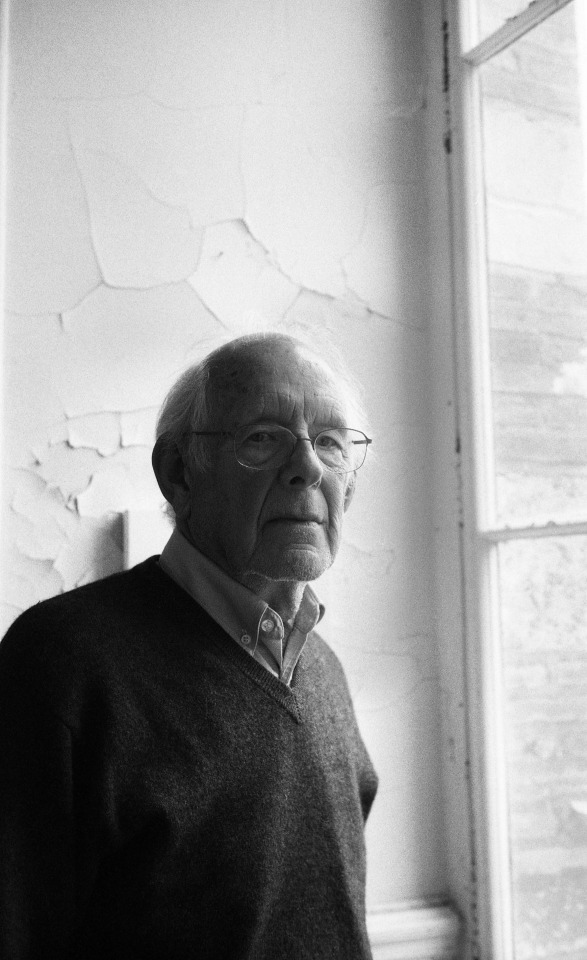


Eugène van Lamsweerde / Artist / Sellières, France. (Interview and photographs published in jane. by the grey attic, Australia 2018).
The second is a DIY naturally lit studio situation. Sandberg took these portraits as promo shots for a Norwegian film that came out in 2021 called The Worst Person In The World.
In terms of the portrait style I like that she plays with different - though only slight - angle changes on classic front on shots. The framing of the subject not always centered and I like the moodyness of the colours in combination with the lighting. The dark backdrop combined with bright yet diffused (what looks like natural light) makes for a fashion editorial-like aesthetic. The facial shadows are very soft yet the contrast is quite strong.
The light in the latter two look like top down but with the models face angle away it produces an almost split lighting effect in the second image and illuminates the back of the model in the second photo. The first photo looks super diffussed with no direct light source - but looks evenly light on both side of the face. However, unlike the latter two the first has no back lighting making the background darker and the subjects hair blend into it.



Joachim Trier, The Worst Person In The World (2021).
The third is from a series of photos Sandberg took of the Tucci family (Gianpaolo Tucci also happens to be a graphic designer and typographer who I heard speak at a type conference last year)
The two shots I chose were taken in two very different lighting situations. The one of the left looks like indoors with very diffuse lighting as there is minimal/light shadowing on the right side of the photo (reflector used for this?). The right photo looks like an outdoor shot with very low sunlight or brighter light (or like a silver reflector) - to be able to get the defined shadow of the baby's head against her face.
Right (Gianpaolo Tucci): A relatively flat image in terms of highlights but offers enough contrast from his darker features (hair and clothing > something I noticed the impact of in my own photos). Only a slight catchlight in his right eye suggest no super strong light sources. Again I do like the off center framing of the subjects face - even with the face not being central to the frame its still balanced.
Left (Christina Bucardo): What I really like is the focus on the eyes, how they are the focus on the image yet aren't fully centered in the image nor are they in the foreground. But they have an intensity with the harsher light focused on that area of her face.
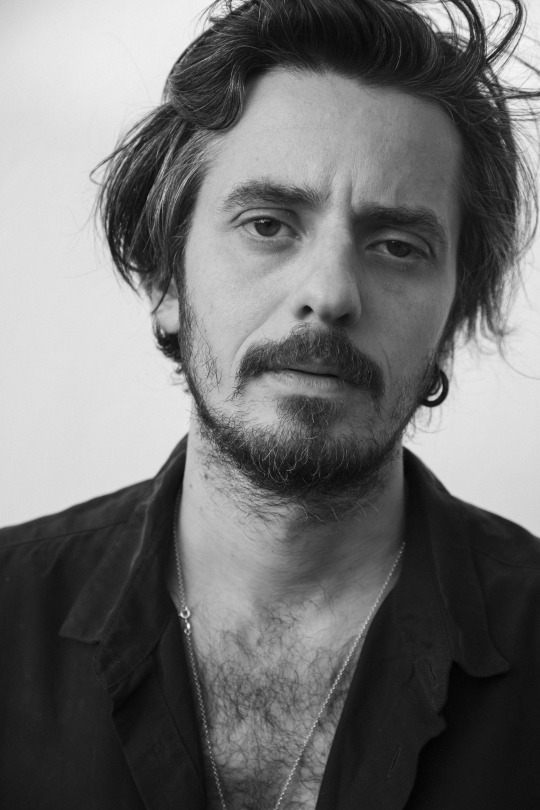

Gianpaolo Tucci, Christina Bucardo and León, Mitte Berlin, 2019
0 notes
Text
Bree Newsome's 'Wake' and the Essence of Black Horror"
Bree Newsome's "Wake" captivated me with the Black Horror genre, not because it focuses on exploring racism, but because it deconstructs morality, human agency, and the repercussions of our actions. The short film opens in a time of death and change, reflecting the female protagonist's conflicting feelings when her, what seems like overbearing, father passes due to his daughter's lack of assistance. Instead of expressing sorrow, she feels liberated, free to follow her life and interests including her newfound opportunity to marry. I believe that Newsome cleverly built a story about internal moral and psychological suffering rather than external racial evil. The protagonist's emotional journey, which was defined by a rich interplay of desire, fear, sorrow, and liberty, mirrors the common human experience of considering the consequences of our decisions.
For me, the discussion of Black Horror, especially in the context of "Wake," provided a fresh insight into the genre. After viewing this short film, I understood that Black Horror is not only about overt racial issues but the genre also adapts to go beyond conventional horror clichés and explores various experiences. In my opinion, the screenplay successfully employs the horror subgenre in a subtle way to reflect the darker aspects of decision-making and its consequences. For example, when the main character performed a seance to conjure her dream man to life, she soon realized that the man who resembled a typical human turned out to be some type of monster. After trying to murder him, she ends up with the repurcussions of being pregnant with the monster’s child; I assume that this is because of all her immoral actions that took place from the start of the story, making this a mortality tale.
Although I haven't experienced circumstances as unsettling as those in "Wake," the movie spoke to me on a personal level, especially in the way it portrayed the lingering effects of remorse and the consequences of unbridled desire. In all honesty, I found this story to be quite interesting but also uncomfortable. As a young woman myself, I do think that it would be pretty ideal to conjure my dream man to life. However, simply thinking about seeing someone I conjured turn out to be an evil monster sounds pretty horrifying. In addition, the uncomfortablility I would personally feel while being at this monster's wake is unimaginable. “Wake” somewhat makes me reflect on my own life; to me, this story shows how having a moral character truly matters because of the karma that may come back to an individual. Even if something is not done with purely evil intentions, I feel as if the universe will find a way to bite back. "Wake" was a moving reminder of the delicate dance that exists between our desires and the reality we make - which to me is a concept that goes beyond the bounds of “typical” Black Horror.
1 note
·
View note
Text
Satanism - a way to embrace Pluto?
My mind has been occupied with Pluto lately, the planet, god and symbol of “the hidden things”, the occult, the underworld, darkness, fate, rage, destruction, transformation, abduction, man’s primitive nature, life and death, power and powerlessness, fear, violation and fertility. There’s so much nuance to all planetary (archetypal) principles and there’s always more to explore. Pluto especially is a mysterious and threatening figure (force) in our lives and in the world at large. I have talked about it in previous posts, here / here and here… I’ve also explored the 8th house, which is the astrological house of Scorpio and Pluto here and here.
Many people understandably avoid anything that has to do with the darker elements of life and human nature until they are forced to deal with them. This is possibly why Pluto has been associated with violence because we are typically dragged into the depths; we don’t go there willingly. Some people, however, have lives that are marked by Pluto to such a degree that they can’t pretend that he doesn’t exist. By deciding to consciously accept him and embrace his influence it is possible to live a richer life. After all, Pluto is not only a god of destruction; he is also a god of riches. It seems to me, that the worship of Satan (as practiced by members of the Church of Satan) is very much in line with Pluto’s gifts and his riches. It’s an attempt to embrace the carnal nature. However, this Plutonian carnality is not as basic as it seems. It has its own intelligence, its own spirituality and its own laws. It seems to me that Pluto has to do with survival – psychological, emotional, spiritual and physical. He stands for survival and life at all levels of the being. As stated on the official website, “To us, Satan is the symbol that best suits the nature of we who are carnal by birth—people who feel no battles raging between our thoughts and feelings, we who do not embrace the concept of a soul imprisoned in a body. He represents pride, liberty, and individualism—qualities often defined as Evil by those who worship external deities, who feel there is a war between their minds and emotions.”
I think, that this philosophy attempts to treasure the whole (hu)man, to recognize his divinity even in his subjective thoughts and feelings. It’s an attempt to honor the darker aspects of human nature – anger, rage, and instinctual responses. It’s essentially to honor the earth, the dark void, and the merciless existence. Putting faith in external deities is robbing the individual of his divinity; it’s separating him from life. Christianity has, at least in part, made people think of Evil as an autonomous force (an external deity), corrupting good souls and creating fear and panic. By avoiding seeing reality as a whole, Christianity perpetuates fear instead of confronting it. As I understand it, Satanists don’t invest belief in any gods (symbolic of human drives and instincts) because they see that these mind-made constructs are part of their own psyche. Satanists place themselves at the center of their own subjective universe without seeking to befriend or worship mythical entities that are separate from them.
It seems to me though, from studying astrology, that there’s no way to escape deity. In the effort to not have any god, to place the self at the center, as is characteristic of the Church of Satan, one is in fact aligning or siding with an archetype. It’s impossible not to. I think this is made quite obvious when using astrology and analyzing natal charts. The archetypal energies are expressing themselves through and as the individuals.
In fact, let’s take a look at the chart of the founder of the Church of Satan, Anton Szandor LaVey. I would expect him to have a strong Pluto because of the emphasis on embracing the carnal side and the spiritual dimension of it. There’s also a big emphasis on being whole (a solar principle) through recognizing the totality of life, facing the strength and power within oneself and using the necessary tools to improve one’s own life. This would include consciously using symbols and images (like the image of Satan) in order to get the desired effect. If symbols are given autonomous power it’s a problem only if it puts the individual in a disempowered position. Personal integrity and liberty is also of utmost importance, which sounds rather Aquarian to me. Let’s have a look.
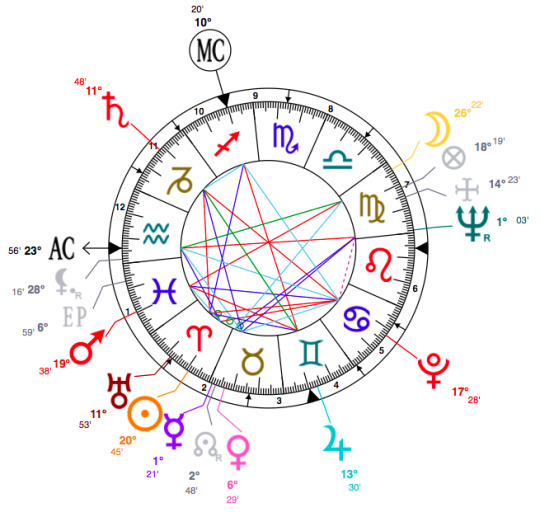
The chart of Anton Szandor LaVey, as found on astrotheme.com.
The Sun is in Aries, which is not surprising considering his strong faith in individuality, his initiative to start a “new religion”, to provide a contrasting influence, to place himself at the “center”, to go by no other rules than his own, to welcome opposition, the desire to be his own master and a leader of his own life. Aries as a sign is strongly linked to the warrior archetype, of fighting for what one believes in without compromise, to claim authority in spirit, to conquer, to place subjectivity over objectivity (because there’s no real difference from the perspective of Aries). Selfishness is the basis for existence; it is through honoring the self that one can honor other people’s independence. Mars, which is the planetary ruler of Aries, is concerned with personal strength and potency (note; Mars is sometimes referred to as the lower octave of Pluto). It seems like LaVey lived on his own terms, relying on his own natural instincts and gifts to get by in life. This is all very typical of Aries people, to live of off a self-generated optimism and conviction of one’s own ability. “The rules don’t apply to me” is the overall sentiment – the rules originated somewhere and that which originates from my own self is no less valuable or divine, even if it’s raw, ugly or imperfect it is still of “The Self”, the force that animates existence.
To no surprise, Pluto makes a square aspect to his Sun. He would’ve lived with the threat of his own destructive rage, his own inner violence and uncompromising desire. To him, it was probably difficult to consciously accept this side (the square aspect always represents a conflict) but he certainly tried to acknowledge his “darkness” through founding the Church of Satan. A person with a trine aspect between Sun-Pluto would not have been as motivated or pressed to bridge the gap between the self and the primitive and taboo because there wouldn’t have been anything to bridge. The square relationships between two planets usually motivate the individual to try to solve dilemma of conflicting principles within the psyche through external work. Squares usually force work in a very concrete fashion. When a person is serious about something, and is trying to make something happen it’s usually indicative of a square aspect within the personal chart. For example, I have a Neptune square Mercury aspect. I try to read and write and educate myself to some kind of higher state, some transcendent and elevated experience because the connection is not smooth between these planets. I try to articulate things properly in order to bridge the gap between personal mind and the nuance of collective feeling. I try to reflect the essence or feeling tone of energies through my writing.
The interesting thing about LaVey is that he truly took on the appearance of a devil – he was probably aware of the power of looks, the impact that certain clothing or symbols have. He was undoubtedly theatrical. Pluto in the 5th house might have something to do with this, as it’s the house of individual expression. The 5th house is all about personal creation; it’s the realm of children and play. In a sense, he was no different from a child dressing up in costumes and playing “the dark one”, which is probably why people mocked him for it. Even when Pluto is in the 5th house it is never light-hearted, he is all in, ruthlessly determined. Pluto placed in this house takes play seriously. He takes personal expression seriously. His creations are his and he should be at the center of them. The individual should be credited for his abilities, not the other way around, just as the individual shouldn’t be appreciated because his gifts are “of the gods”. They belong as much to the individual as it does to the deities. This is certainly the spirit of Pluto. He answers to no other god than himself and he sees life as it is, in its most vile forms, without flinching. Life is in all expressions, in the primitive as well as in the sophisticated. This is, in many ways, a deeply honest way to live. Another thing that catches my attention is the bi-quintiles Pluto makes to the MC (public image) and the AC (personal image/persona). The bi-quintile aspect is generally considered to say something about a certain talent or style, a mercurial quality or skill. He truly has the style of Pluto, both in his countenance and in his societal achievements. He looks dark and mysterious, preoccupied with the occult side of life. Perhaps he even had a certain talent for “magic”, at least he claimed to.
Satanists believe in indulgence (which doesn’t imply compulsion) over abstinence, primarily because there’s no belief in heaven or an after life. The individual is placed at the center of his own universe as his own master – through and through. Although many people would agree that self-mastery is a good thing, many also tend promote, in the same vein, that “people make mistakes” and that they “should be forgiven”. As I understand it, Satanism as a philosophy would state that mistakes are only mistakes if the self-mastered individual firmly believes it to be so in complete honesty and integrity. Self-deceit is considered to be a sin, unless of course it’s done intentionally - it would then not be a sin. Going along with roles that other people have cast one in is self-deceit – that is, for example, shouldering the role as a “sinner” because other people have imposed that label or role onto you is not indicative of self-respect, it’s a betrayal of your own reality. Notably, LaVey has an Aquarius Ascendant, Lilith in Aquarius in the 1st house and Uranus widely conjunct his Sun (both in the independent sign of Aries). He is definitely not a person to follow the herd – in fact “Herd Conformity” is one of the Cardinal Sins in Satanism. He leads life through the principle of being his own godhead, his own intellectual genius, and his own unique and separate individual, detached from the norms and conventions enough to go against them if he pleases. Aquarius is a sign that considers the map of life in an intellectual sense. This sign is also the sign of the progressive individual, someone who wants to make a difference on a larger scale. He certainly did, through constructing a thought-system that could benefit people. It’s no wonder that the first of the Nine Cardinal Sins (as found on the official website) is Stupidity. Of course it would be to an Aquarius Rising! “Think for yourself; don’t go along with everything you’re told” is the plea.
#pluto#astrology#planets in astrology#satanism#aries sun#aquarius rising#pluto in astrology#devil worship#plutonic forces#natal chart analysis#natal chart#satan#darkness#darkness and light#anton lavey#natal chart exploration#deity#religion#embracing pluto#individualism#philosophy#liberty#pride#power#sun square pluto
42 notes
·
View notes
Photo


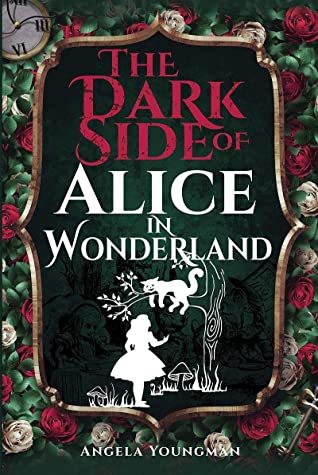
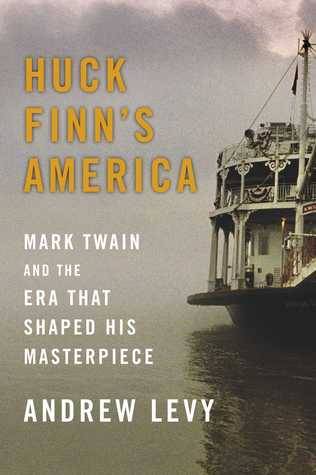
Criticism & Literary Interpretations
A Swim in a Pond in the Rain: In Which Four Russians Give a Master Class on Writing, Reading, and Life by George Saunders
For the last twenty years, George Saunders has been teaching a class on the Russian short story to his MFA students at Syracuse University. In A Swim in a Pond in the Rain, he shares a version of that class with us, offering some of what he and his students have discovered together over the years. Paired with iconic short stories by Chekhov, Turgenev, Tolstoy, and Gogol, the seven essays in this book are intended for anyone interested in how fiction works and why it’s more relevant than ever in these turbulent times.
In his introduction, Saunders writes, “We’re going to enter seven fastidiously constructed scale models of the world, made for a specific purpose that our time maybe doesn’t fully endorse but that these writers accepted implicitly as the aim of art—namely, to ask the big questions, questions like, How are we supposed to be living down here? What were we put here to accomplish? What should we value? What is truth, anyway, and how might we recognize it?” He approaches the stories technically yet accessibly, and through them explains how narrative functions; why we stay immersed in a story and why we resist it; and the bedrock virtues a writer must foster. The process of writing, Saunders reminds us, is a technical craft, but also a way of training oneself to see the world with new openness and curiosity.
A Swim in a Pond in the Rain is a deep exploration not just of how great writing works but of how the mind itself works while reading, and of how the reading and writing of stories make genuine connection possible.
A Little Devil in America: Notes in Praise of Black Performance by Hanif Abdurraqib
A stirring meditation on Black performance in America from the New York Times bestselling author of Go Ahead in the Rain
At the March on Washington in 1963, Josephine Baker was fifty-seven years old, well beyond her most prolific days. But in her speech she was in a mood to consider her life, her legacy, her departure from the country she was now triumphantly returning to. “I was a devil in other countries, and I was a little devil in America, too,” she told the crowd. Inspired by these few words, Hanif Abdurraqib has written a profound and lasting reflection on how Black performance is inextricably woven into the fabric of American culture. Each moment in every performance he examines—whether it’s the twenty-seven seconds in “Gimme Shelter” in which Merry Clayton wails the words “rape, murder,” a schoolyard fistfight, a dance marathon, or the instant in a game of spades right after the cards are dealt—has layers of resonance in Black and white cultures, the politics of American empire, and Abdurraqib’s own personal history of love, grief, and performance.
Abdurraqib writes prose brimming with jubilation and pain, infused with the lyricism and rhythm of the musicians he loves. With care and generosity, he explains the poignancy of performances big and small, each one feeling intensely familiar and vital, both timeless and desperately urgent. Filled with sharp insight, humor, and heart, A Little Devil in America exalts the Black performance that unfolds in specific moments in time and space—from midcentury Paris to the moon, and back down again to a cramped living room in Columbus, Ohio.
The Dark Side of Alice in Wonderland by Angela Youngman
Although the children's story Alice in Wonderland has been in print for over 150 years, the mysteries and rumors surrounding the story and its creator Lewis Carroll have continued to grow.
The Dark Side of Alice in Wonderland is the first time anyone has investigated the vast range of darker, more threatening aspects of this famous story and the way Alice has been transformed over the years.
This is the Alice of horror films, Halloween, murder and mystery, spectral ghosts, political satire, mental illnesses, weird feasts, Lolita, Tarot, pornography and steampunk. The Beatles based famous songs such as Lucy in the Sky with Diamonds and I am the Walrus on Alice in Wonderland, while she has even attracted the attention of world-famous artists including Salvador Dali. Take a look at why the Japanese version of Lolita is so different to that of novelist Vladimir Nabokov - yet both are based on Alice. This is Alice in Wonderland as you have never seen her before: a dark, sometimes menacing, and threatening character.
Was Carroll all that he seemed? The stories of his child friends, nude photographs and sketches affect the way modern audiences look at the writer. Was he just a lonely academic, closet pedophile, brilliant puzzle maker or even Jack the Ripper?
For a book that began life as a simple children's story, it has resulted in a vast array of dark concepts, ideas and mysteries. So step inside the world of Alice in Wonderland and discover a dark side you never knew existed!
Huck Finn's America: Mark Twain and the Era That Shaped His Masterpiece by Andrew Levy
A provocative, exuberant, and deeply researched investigation into Mark Twain’s writing of Huckleberry Finn, which turns on its head everything we thought we knew about America’s favorite icon of childhood.
In Huck Finn’s America, award-winning biographer Andrew Levy shows how modern readers have been misunderstanding Huckleberry Finn for decades. Twain’s masterpiece, which still sells tens of thousands of copies each year and is taught more than any other American classic, is often discussed either as a carefree adventure story for children or a serious novel about race relations, yet Levy argues convincingly it is neither. Instead, Huck Finn was written at a time when Americans were nervous about youth violence and “uncivilized” bad boys, and a debate was raging about education, popular culture, and responsible parenting — casting Huck’s now-celebrated “freedom” in a very different and very modern light. On issues of race, on the other hand, Twain’s lifelong fascination with minstrel shows and black culture inspired him to write a book not about civil rights, but about race’s role in entertainment and commerce, the same features upon which much of our own modern consumer culture is also grounded. In Levy’s vision, Huck Finn has more to say about contemporary children and race that we have ever imagined—if we are willing to hear it.
An eye-opening, groundbreaking exploration of the character and psyche of Mark Twain as he was writing his most famous novel, Huck Finn’s America brings the past to vivid, surprising life, and offers a persuasive—and controversial—argument for why this American classic deserves to be understood anew.
#nonfiction#non-fiction#nonfiction books#literature#criticism#critical thinking#analysis#interpretation#classics#english literature#literary#reading recommendations#Book Recommendations#library#800s#history#literary criticism#russian literature
8 notes
·
View notes
Video
youtube
ironwoods tragic fall from grace
comments on youtube
When a hero becomes the villain, all hell breaks loose. Especially when the fallen hero is general of the Atlesian army.
The only thing that I noticed was that Ironwood has constantly grown a Beard as time passes. He's slowly decending towards from Hero to Villain as a "Fallen Hero" Catagory.
James Ironwood WAS a good man, utterly dedicated to protecting his people. It was with the best of intentions that he charged down the path he’s taken... but you know what they say about good intentions.
I didn’t think his semblance was much of a factor into his decisions before Vol 7 but now as he’s become more unhinged every chapter, it’s becoming even more strikingly obvious that he’s become a slave to it. The fact that his semblance increases his resolve to go through with bargaining with Watts, willing to blow up Mantle just to save Atlas.
He's like the antithesis of Leonardo Lionheart
You know, this is a really good counter for all those people saying Ironwood is suffering character assassination. He's not. He's giving in to fear and letting his worst aspects take command.
I’m personally asking again why would the writers talk about something like Ironwood’s semblance outside the show when for the most part the majority of people only watches the show, that’s like how the Russo brothers (the writers and directors of Avengers Infinity War and Endgame) choose to answer the hows and why on Twitter when the majority of people are only watching the movies I personally love those movies but it also would’ve been nice to see those things get explained or talked about in the movies just like how it would be nice to at least mention Ironwood’s semblance in the show
Honestly, I love what they're doing with Ironwood. His slow, inexorable descent into extremism is a wonderful exploration of how an idealistic person who believes themself to be the hero can tumble into villainy without trusting others to keep them grounded. It's the very real problem of the philosophy of "The ends justify these particular means;" if you can justify one morally gray decision to achieve a good goal, it gets easier to justify the next, darker gray decision. Without someone outside to call you on your bullshit, you're eventually justifying genocide because it will be for the "greater good."
Ironwood is literally the Darth Vader of RWBY. He starts of as a respectable character, commanding his own army for the good of all. But he gives in to all of his fears, looses a limb or 2, and slowly turns misguidedly evil, willing to kill ANYONE who stands in his way.
I've said before that Team Rwby is a foil to the Headmasters. Ruby keeping secrets like Oz, Leo/Blake, the faunus who ran away when things got hard, and Ironwood's parallel is Yang.
Not just obvious stuff, like both having metal arms. But both of their semblances are double edged sword. Yang get stronger taking damage, but if she leans on it too much, an enemy that takes one hit just destroys her since she can't fight back. Volume 4 has her training with Taiyang to correct this flaw in her thinking, leading to her overcoming Adam in her rematch in V6.
Ironwood's semblance can be incredibly powerful. Just off the top of my head, he basically no sells the Apathy, which is an incredibly dangerous Grimm in a group with other, stronger Grimm. But it has downsides, and we're seeing it. The correct way to use it is after you've made a choice, to focus on the task at hand. But making large choices while under the semblance is not smart. He's too focused on one action to see others that have opened. Atlas has to be raised, because that's what he's already decided to do. The idea that they've made contact with the world and reinforcements might be coming never entered his mind. Similarly, he's so focused on forcing Penny to heel that he's not seeing he has a chance to have her come willingly by aiding in Mantle's rescue.
He's so focused on winning this one battle (Having Penny raise the city to escape Salem immediately) that's he's making choices to doom the larger war (defending the kingdom's people, defeating Salem, reuniting the world).
He clearly knows that it isn't smart to rely on it this way, since he's shown the ability to take criticism and adjust his thinking in Volume 7 (Nora would've been Slate'd if he couldn't). But the combination of Yang/Blake going behind his back to tell Robyn, Ruby/Oscar not telling him the truth, Qrow seemingly killing Clover, and, right when he thought that he'd saved everyone, the idea that every single thing he's done might've been exactly what Salem wanted has fairly understandably shaken his faith in the others around him. He can't rely on them to rein him in, he has to do that... which is exactly the problem with his semblance. If the only person who can stop you is yourself, and you're convinced you're always right, you've doomed yourself.
I'm assuming that he could probably be talked down by Glynda or potentially Oz or Qrow (fat chance of that one) if they can break his aura, but as it stands, unless someone beats him down, he's not going to be able to stop himself.
With Ironwood I am reminded of a very profound quote from CS Lewis, that I feel summarizes him very well: "Of all tyrannies, a tyranny sincerely exercised for the good of its victims may be the most oppressive. It would be better to live under robber barons than under omnipotent moral busybodies. The robber baron’s cruelty may sometimes sleep, his cupidity may at some point be satiated; but those who torment us for our own good will torment us without end for they do so with the approval of their own conscience. They may be more likely to go to Heaven yet at the same time likelier to make a Hell of earth. This very kindness stings with intolerable insult. To be “cured” against one’s will and cured of states which we may not regard as disease is to be put on a level of those who have not yet reached the age of reason or those who never will; to be classed with infants, imbeciles, and domestic animals."Show less
Dude Ironwood didn't have a problem with trusting people and didn't have a mentality of not being able to trust people. He trusted to much and trusted people who both betrayed his trust (Yang/Blake) and didn't reciprocate the trust he gave them (Ruby and the rest of the main cast). Honestly, he would have been perfectly right to have immediately put the relic of knowledge into the vault at the start of v7 and then send the students on their way and have nothing more to do with them.
Ironwood saw Atlas and his fleet as a way to inspire hope. It's ironic that his plan was one of lifting them up so high that nobody would ever be able to see them anymore.
My only criticism with Ironwood is that I really really wish his semblance was brought up in the show. Are they ever going to bring it up? I absolutely LOVE how he has been written and watching his tragic descent into becoming a villain but having his semblance mentioned in show would be great. Is someone going to have to break his aura or something before he or someone else mentions it?
In a way he is. His semblance is a double edge sword, as someone in Ironwood's position is all about making calls. Ironwood was able to climb through the ranks because his semblance allowed him to follow through with his actions to save people (I also still wonder what happend to halve of his body as he already had a metal leg and arm in volume 2, we can asume the paladin project, but some confirmation would be wonderfull). Now he's following through on his words agains Salem, that Ironwood isn't going to let Salem take the relic of creation. Ironwood essentially only has this thought he is focused on and is disregarding everything else.
Right now Salem is piecing herself together again and Penny is going to the vault, if Ironwood semblance of Mettle wasn't interfering he would be able to see the bigger picture of let Penny open the vault, take out the staff of cration and chuck whatever goop Salem is right now with the bit of land she is piecing herself on right now and throw that into the vault and close it for good by blocking off the entrance with concrete. Voila.
Ironwood doesn't notice at this point his actions as he even thought councilman Slate, who was asking Ironwood to explain his action got put down by Ironwood himself. Same for Marrow later on, but Winter was able to step in. Ironwood needs to be saved from this mindset and I think the team up of Qrow and Robyn (also who ever was on the elevator, I think it was Winter and Marrow as Winter was taking him away to be put in jail) could save Ironwood to the point of breaking his aura that way the influence of Mettle will loosen.
Gonna be honest, I dislike the whole concept of his semblance and it being what's driving him to this is just dumb to me. I loved him as a character and this entire volume feels like every bit that made him an interesting character has been ripped away. It's likely just me, but prior to Oscar using the built-up magic to beat Salem it felt like they had painted themselves into a corner. Either Ironwood was proven right that some sacrifices had to be made for the good of the people, or Salem was going to be beaten and even if she can come back, she no longer feels like a huge threat to me. I loved Ironwood in volume seven and many of team RWBY's choices have infuriated me for how contrived and stupid they manage to be while also contradicting themselves so easily. To be frank, I feel like his semblance was just an excuse for this utterly stupid character assassination they're trying to justify.Show less
I kind of feel like the writers 'forced' Ironwood to become a villain. Some of his decisions just don't make sense.
6 notes
·
View notes
Text
A Rambling about Obey Me and some of the discourse going around:
I’ve finally had a chance to sit down and think hard on the whole Lucifer didn’t listen to the MC say no in the newest event.
First of all, this post likely won’t be spoiler free so read at your own risk. I’m not going to censor myself for those who haven’t played up through Lesson 20 but most of the things I hit on is common knowledge anyways.
Secondly, I do not condone what they implied that Lucifer did. Consent is important, that’s not the point of this post. I’m not saying it’s okay to do so. This is simply the context of the game and my own viewing of it from a writer’s standpoint.
I put it under a cut because this is a long post.
Okay, now that we have all the disclaimers and stuff out of the way, let’s move into my own thoughts.
Firstly, this was meant to be dream sequence. I know a lot of people gripe about it doesn’t matter that it was dream, but if it’s supposed to be mc’s dream, then likely this particular mc was probably meant to be paired with Lucifer, they just gave options for those who aren’t Luci stans to get more people to play. But was a dream, and likely meant to represent an mc that wants Lucifer.
Was it a good writing choice to add in a choice to say and then do it anyways? Probably not, because this kind of thing always gets backlash from the community (i.e. Arthur in Ikevamp). But they did it, and it wasn’t explicit, nor did it actually say that Lucifer actually went through with it, again, because it was a dream and it ended at that particular point. You can argue that it shouldn’t have been implied, but you can also argue that it didn’t happen because it was simply an implication. The point that is made though, is that Lucifer didn’t respond in a “Okay, I’ll stop” manner. As far as him being a character and a demon, that response would be really strange, to me. Is it right? No, no one should force themselves on anyone. Is it a normal response for a demon who is the avatar of pride and thinks humans are lowly creatures? Yeah, kind of.
Secondly, this game is dark as hell. A lot of people don’t want to see it that way, because it’s an otome game and otome’s are typically solely focused on the romance aspect. Obey Me is riddled with violence, sexual tones (i.e. Asmo outright tells MC that the bar they are at is has sex rooms and can even be bought out for an orgy, and he has participated in those), and the main boys are even avatars of sin. It’s not an otome with a sprinkle of angst and sadness for backstory and character development. It’s a dark and twisted world where you can romance demons.
Speaking of demons, that’s my next point. The boys are demons. They have been around for millenniums, and demons are not known to have morals and live by our human standards of what is right and wrong. (again, see above, I don’t believe what Luci was implied to do was right.) But honestly, you cannot expect demons to have the same moral code that us humans do. It wouldn’t make sense and to be honest, it’s part of the appeal of the game.
Part of the underlying themes and tones of this game is that romancing a demon is taboo. It’s not going to entail the same trials and character problems that other otome suitors deal with. These aren’t boys. These are demons, powerful demons with their owns sins and they also believe that they are above humans. So, being above humans, of course Lucifer doesn’t really care if you say or not. He’s a demon and he is used to getting his way. He’s also the avatar of pride so he can’t fathom why you wouldn’t choose to be with him. (Again. I do not think it’s right for Lucifer to force himself on anyone.) From a writing standpoint, that was a perfectly acceptable thing for Lucifer to say, because of who he is as a character and a species. (But that doesn’t make it okay. I never said it was okay. I said it was normal for him as a character. I do not condone forcing anyone.)
Was it necessary for the story? That’s a little more difficult to define. I understand that this can be triggering material for some, and you are perfectly valid to say you didn’t like it and it was wrong. I don’t personally think that they made a huge mistake and should be reprimanded for it. It’s a story with dark themes and violence so it’s reasonable to assume that things like this are going to occur. They are demons with a very skewed sense of morals. But I totally get that there are people out there who don’t like reading that kind of triggering content.
I think a good middle ground would be to add some kind of warning to events or chapters. I don’t know how they would implement something like that, but it might be a more peaceful solution instead of going to the creators and telling them that they are wrong to add that content. Because, let’s be honest, not everyone is bothered by that kind of thing and creators can’t always cater to everything that might be a trigger to someone. For some, that kind of content is wanted and there aren’t any otomes that I’m aware of that has the option to explore those darker kinks. (Please don’t bring up Princess of the Moon Ultimate. That game is not what I mean.)
Obey Me really teeters on the edge of being too adult for minors, but there is plenty of content in the games that are okay for a younger audience. No matter what anyone says, the younger kids are not going to stop playing just because a stranger on the internet told them to. It’s not going to happen, so really, it’s only stirring up drama. I will say that minors should stay away from explicitly adult content created by us adults, mostly because of legal reasons, but again, I don’t think it’s going to stop anyone from doing it if they want to. Just know, that as adults, it’s really uncomfortable to think of minors engaging in explicit content. You are still children, whether you think so or not, but you’re going to play the game regardless (I know because back in my day, I did too). I think the middle ground for this is for minors not to engage with adults in any explicit or sexual themed content or talk. That’s about the most we can ask. Telling them not to play the game isn’t solving anything. (Please don’t come at me with this drama. I don’t want to hear about why they shouldn’t play or why they should be allowed, I don’t care about it.)
This kind of rounds me up to a big final point. I got off track with the content thing but back to the demons and their morals.
This why Obey Me is such an interesting story to me. The point of the whole game (so far) is that YOU are the one controlling the demons with the pacts. It takes a while for Lucifer and Belphie, but in the end, you get a pact with all of them. This really eliminates a lot of the dangers with the brothers. They obey you now. So, in the main story game (after lesson 20), if that Lucifer scene had happened (remember, it’s a dream), if you had chosen the NO option, then he would have no choice but to listen to you. Because the pact allows you to control them (we see this time and time again with MC telling Mammon to do things or stop doing things).
Which opens up the opportunity for you as the mc to teach them. I know this isn’t a prominent part of the game (it’s still real early to tell what’s going to happen) but now that you have them under a pact, you have the opportunity to reign in their sins and teach them to be decent demons. And honestly, it’s really one of the only ways that they could have handled the demons and a human in a romantic relationship. There is no such thing as a morally righteous demon. That would be angels (hello simeon). It’s going to be very interesting to see how having a specific suitor under a pact will effectively even the playing fields in a romantic relationship.
Take Asmo for example, as the Avatar of Lust. Before the pact, the scales of power were completely in Asmo’s hands. As a human, you literally couldn’t do anything to stop him from doing anything (hence the fact that Belphie literally kills mc, and there has been very dangerous situations). He’s a demon with enormous powers and the mc is a lowly human. And honestly, with Asmo being a narcissist, he probably wouldn’t understand why you wouldn’t want him. He’s Asmodeus. He’s wanted by everyone.
BUT
With the power of the pact, the scales of power in the relationship tip into the MC’s favor. Will this stop them from trying? Not at all, but now MC has the power to make them stop. And that’s really the only way that a relationship could happen. The power difference is simply too great for a human to date a demon without that added layer of control in MC’s hands.
I know that this is an otome game, and it’s supposed to be about romancing them and all that, but the story is riddled with dark tones and themes and it will most likely have more triggering material. I think that’s something that everyone is going to have to accept in this game. It’s not a lighthearted romance with angst and sex. It’s definitely not as dark as like Diabolik Lovers, but like vampires, demons have a whole added layer of twisted and taboo subjects that are going to play a large role in the game.
And I think that’s part of the point. This game is not going to be like Cybird’s games. It’s not going to be like MLQC. Personally, I like the idea of a darker game with wiggle for more adult oriented themes and content that we miss out on in the other games (i.e. I would have loved to seen a part of Edgar’s route where Claudius orders him to kill MC and he struggles with doing it or not and maybe even harming her in the process of figuring it out. Because, Edgar is kind of brainwashed by Claudius and it tracks for his character. But its romance otome, so of course, they weren’t going to take it that far.). Exploring the darker sides of romance, allowing for more raw and twisted concepts.
All in all, if you want a happy go lucky, suitors with cute romance and just a bit of angst and sex, this is not the game for you.
I also don’t think that going after the creators and saying that they shouldn’t put out darker content and having Lucifer do what he did in that event was right. This game is going to have uncomfortable topics and ugly moments. They are demons and this is devildom (see also: hell). Warnings would be great, I think finding a balance is good, but the creators are making this content for a broad audience. Not everyone is going to be happy. You can either take it with a grain of salt, and continue playing. Or you can not play it because you don’t like some of the content. The content creators don’t owe us anything. The whole “well this is for a western audience” is mute. There is likely going to be other triggering content because of the nature of the game. You can’t expect a dark otome to not have that, just because it triggers you. Warnings, yes, I think that that would help, let people know what they might be getting into in an event or chapter, but catering to the needs to every single player of a game is not going to happen, and it could cause the game to be shut down. This game is more adult oriented so it’s going to have more adult content that might not sit right with you.
I’m gonna end this by saying: Obey Me is an amazing game, and it has quite dark content in places. That’s the whole point of the game. It’s not a standard romance otome and trying to change it to be one is not okay. That doesn’t mean that your feelings toward it aren’t valid. It simply means that we cannot expect the same content as other otome games when it involves darker content. I don’t really want a watered down version of this game where they ignore the dangers of demons for the sake of romance.
I am gonna repeat a few things: I do not condone Lucifer’s actions, that’s not what I’m about. No one should force themselves on you. And this is filled with my opinions, yours can differ, but I’m not looking for anyone to come tell me why I’m wrong. This is just a few points of why I personally think that the game is doing just fine and doesn’t need to change.
95 notes
·
View notes
Text
Ranpo Edogawa: The Solution of a Locked Room Mystery
Ranpo is the character who more than anyone else symbolizes the Detective Agency:

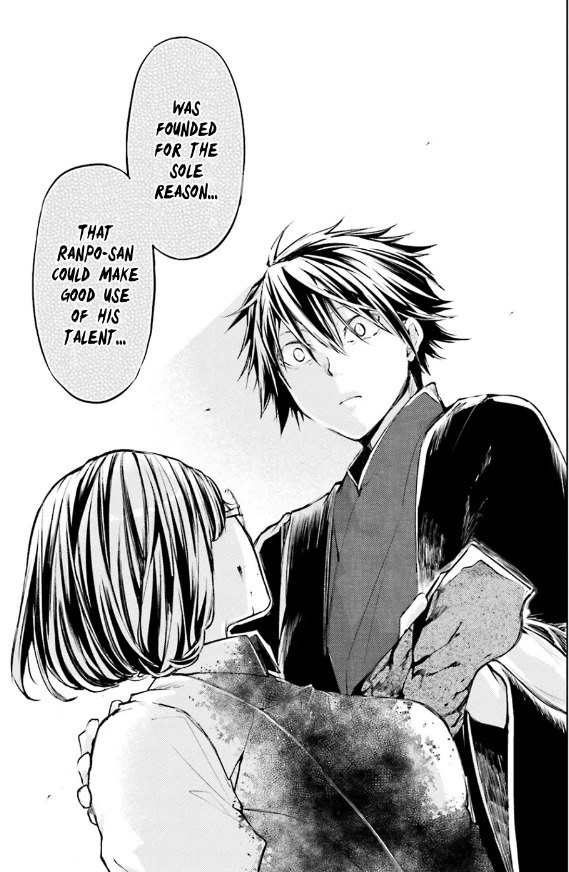
Not only was the agency created specifically for him, but even superficially he is the one among his colleagues who mostly fits the classical image of a detective.
This is made clear since his introduction where he wears clothes one would normally associate with a typical detective and where the name of his ability is shown to be “ultradeduction”:

Because of this, the chapters centered around him are often metaphors or foreshadowing of what is going on or will happen to the other characters or even to the agency as a whole as @hamliet (who helped out also with other thoughts) pointed out.
At the same time each one of his cases is used to explore his character and to make him slowly progress in his personal arc.
MURDER ON D STREET: A TRAGIC LOVE AND THE BEST ABILITY IN THE WORLD
The first case solved by Ranpo is the one where a young and corrupted police officer accidentally kills his lover in an attempt to stop her from exposing a corrupted politician.
This section will concentrate on two aspects of this case.
1) The first one is the general themes touched by the case.
2) The second one is Ranpo’s starting point as a character.
General Themes: Betrayal and Society’s Barriers
Sugimoto and Yamagiwa’s story touches on some interesting ideas which are important for the series and for the mafia arc specifically.
First of all let’s consider this:
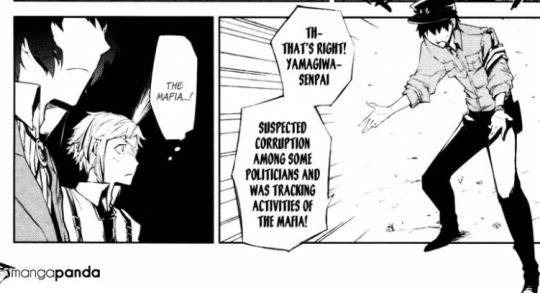
Yamagiwa is introduced as a woman who is investigating on two distinct topics. She is researching both corruption among politicians and the mafia.
The trick of the chapter is that by that point the readers are obviously more invested in the mafia rather than in politics. After all, Atsushi has just been attacked by Akutagawa and Higuchi and it has been revealed that Dazai used to be part of the organization.
Some clues seem to connect the murder to the mafia as well:
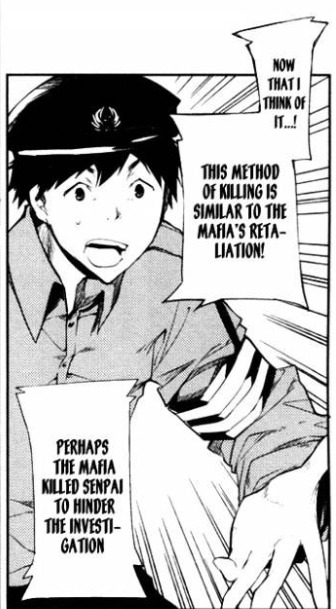
However, they are soon revealed to be misleading and the true reason behind the murder has nothing to do with the mafia, but rather with the politician i.e. the other object of Yamagiwa’s investigations.
This is interesting because it is an instance of what I talked about in this meta.
The mafia is clearly a violent organization which is a problem for society, but its presence is accepted and wanted on some level by those with power. As a matter of fact not only does the mafia let the problem of the underworld go unaddressed, but it can also be used as a scapegoat when needed, like this murder case clearly shows. If the politician and the officer’s plan had worked the mafia would have been considered guilty and that would have been the end of it.
In short, this case is already addressing what the series will explore later on aka that thinking that the mafia is the only one responsible for the corruption of society is simplicistic and won’t fix the problem. This concept will be conveyed in the chapters which follow thanks to a sympathetic focus on both Kyoka and Akutagawa who are both portrayed as victims to an extent.
At the same time, the love story between the police officer and the victim clearly shows what Ango says here:
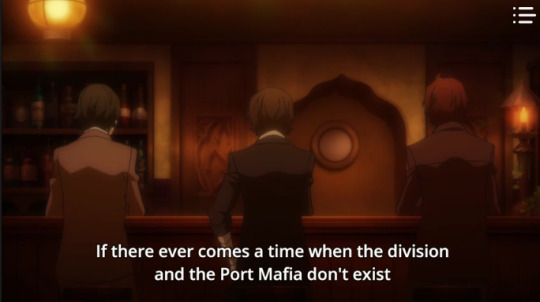

In other words society builds barriers which make so that even if people genuinely love each other they are separated.
This is something which comes up several times in the series and the chapter seems to highlight it also in relation to Dazai and the mafia:

It is meaningful that Dazai aka a mafia traitor is the one describing the method used by the mafia to kill traitors. It is obvious that the whole scene underlines the conflict between Dazai and his previous organization. In the end Dazai left some people behind when he quit the mafia and many issues are still unsolved specifically because of the barriers which exist between people of different groups.
However, it is also shown that personal connections can overcome these barriers:
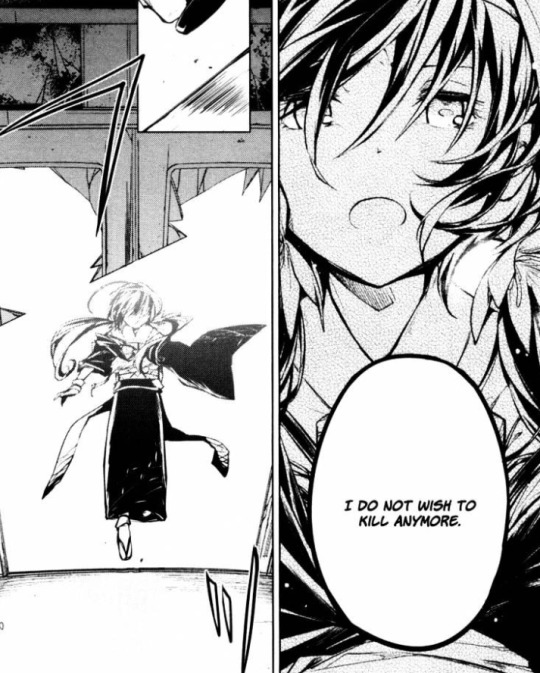
Kyoka, just like Sugimoto, is a criminal who is driven to suicide. However, in her case, Atsushi is able to save her and later on thanks to Atsushi and Dazai’s help Kyoka is able to leave the mafia and to overcome that barrier which was separating her from society.
In the end, the importance of feelings is something present in the chapter itself since the reason why justice prevails is this:
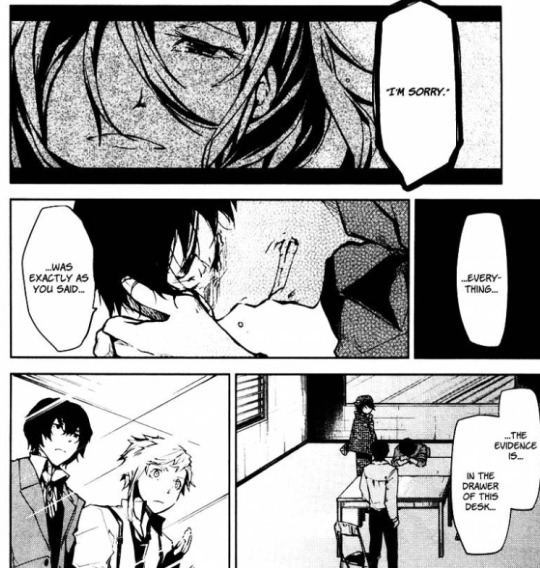
The police officer is too late to save his lover, but the feelings he has for her leads him to help into arresting the politician she was investigating on. In other words, personal connections are what finally help the officer to become a true policeman and ironically this happens when he has already become a murderer as well.
This leads us to the last point concerning this case and general themes and characters aka the fact that the police officer can be seen as a foil to Atsushi:

Just like Atsushi, the officer wanted to belong to a place where he could help people. He was surely very determined about it since he took the exam three times, but he clearly lost himself because in the end he accepted to basically become a criminal in order to “appear” as a policeman.
Obviously this is not the case of Atsushi, but it is interesting to highlight once again that Atsushi’s attitude towards saving others has not really its roots in morality, but rather in Atsushi’s natural ability to empathize and in a very unhealthy mindset which was given to him by the headmaster:

At the same time, Atsushi has stated to be ready to resort to criminal actions in order to survive when he himself had been sent away from the only place which he could call home:
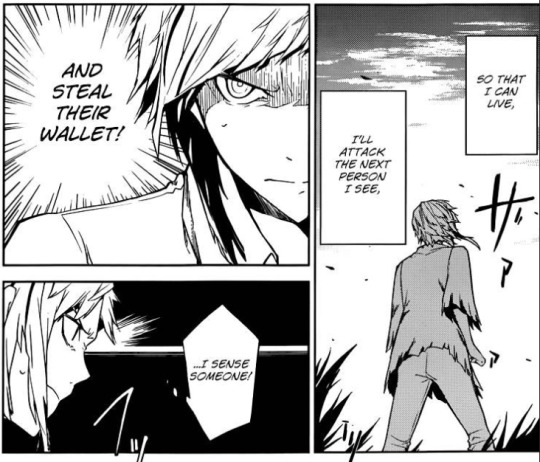
Luckily Atsushi differently from Sugimoto finds another place where he is accepted and he passes his entrance exam, while Sugimoto fails his three times. This is interesting because we can assume that the exam to enter the police was about abilities, while all in all the ADA’s entrance exam is about the person’s character. Of course the ADA also wants its members to be capable and Atsushi had to show how he would react under pressure, but in the end what comes across in that exam is mostly Atsushi’s personality and his wish to protect others.
In short, the ADA is an organization which at the end of the day values people because they are people and not because of their abilities.
At the same time, it is interesting that both Atsushi and Sugimoto who appear meek and nervous have a darker side. Sugimoto accepted to work for the politician and once he accidentally kills Yamagiwa he does his best to hide the crime even if he has to shoot her two more times which is something he himself calls cruel. Atsushi’s darker side is symbolized by the tiger which is powerful and violent and which Atsushi is scared of.
All in all, Sugimoto is a worse version of Atsushi. He is a person who lets his wish to belong and societal pressure get the better of him. Because of this, he ends up killing a person who genuinelly loves him. In short, he has not been able to channel his darkest instincts in a positive way and regrets it. Atsushi must avoid doing the same and has already progressed in his journey much more than Sugimoto ever did.
That said, he still shares with Sugimoto one tendency which can be dangerous:

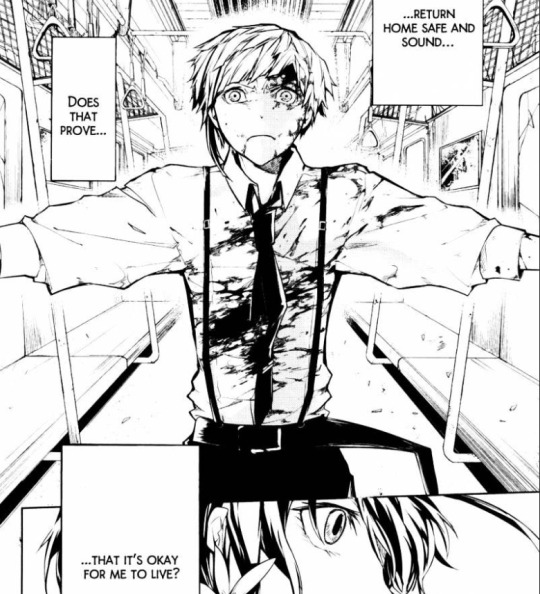
Atsushi has been shown to be ready to hurt himself in order to save others and Sugimoto tried to make his lover change her mind by killing himself.
Of course, Sugimoto’s attempt is much more manipulative, less noble and less well adjusted than many actions Atsushi takes to protect his loved ones. However, I think Sugimoto’s story might very well highlight how dangerous such a self-dismissive attitude is:
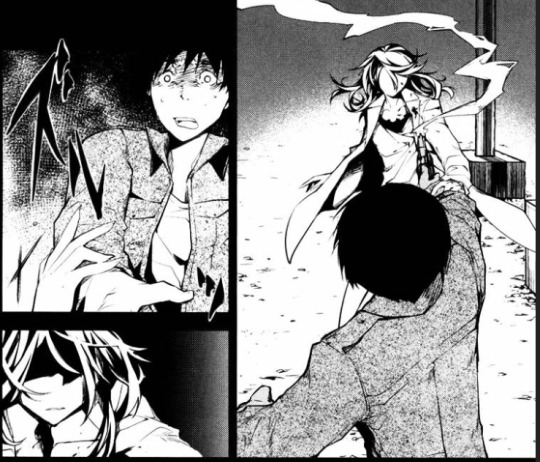
As a matter of fact, in the end, his willingness to harm himself is what leads to Yamagiwa’s death.
Ranpo’s Arc: the Most Powerful Member of the Detective Agency
Ranpo is introduced in the story in this way:

He is shown to be incredibly respected and loved by the other members of the agency to the point that even Kunikida who is famous for his strictness does nothing to discipline him.
In short, as said above, Ranpo is the true heart of the agency and this is interesting and ties with the reason why our protagonists are detectives in the first place.
After all, the main conflict of the series has very little to do with a classical detective story.
It is true that the characters must often use their intelligence to win against their enemies and to deduce things, but fighting and the way they use their special abilities are things which get the same amount of focus.
Then, why exactly is the ADA a detective agency? For the themes and the plot of the story they could have easily been something else, for example they could have been a group of handymen accepting different kinds of requests (a group like the ones in Gintama and Sket Dance for example). However, they are detectives instead and the reason why has to do with Ranpo in-universe. As a matter of fact Fukuzawa decided to create an agency for detectives specifically because that was Ranpo’s talent and passion.
That said, why is that so thematically?
I think that in order to answer this question it is interesting to consider what the charm of many classical detective stories is. Traditionally, classic detective stories are about a mysterious crime which is solved thanks to the intelligence of a character who plays the role of the detective. As tme went on the genre evolved and many sub-genres started to form and they introduced many variables. However, it is obvious that Ranpo’s character takes inspiration from classical detective stories:
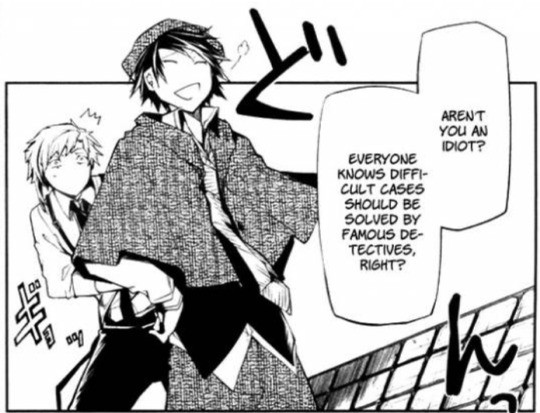
Every case needs a great detective to be solved because in this way justice and order prevail. This is what happens in classic detective stories. What is more, the reader is usually invested in the story because they want to know the truth behind the mystery like who committed it and how and are fascinated by the deductions made by the detective.
However, when it comes to Ranpo, it is interesting that his cases focus much more on exploring the characters’ interiority rather than on him explaining how he arrived to a certain solution:
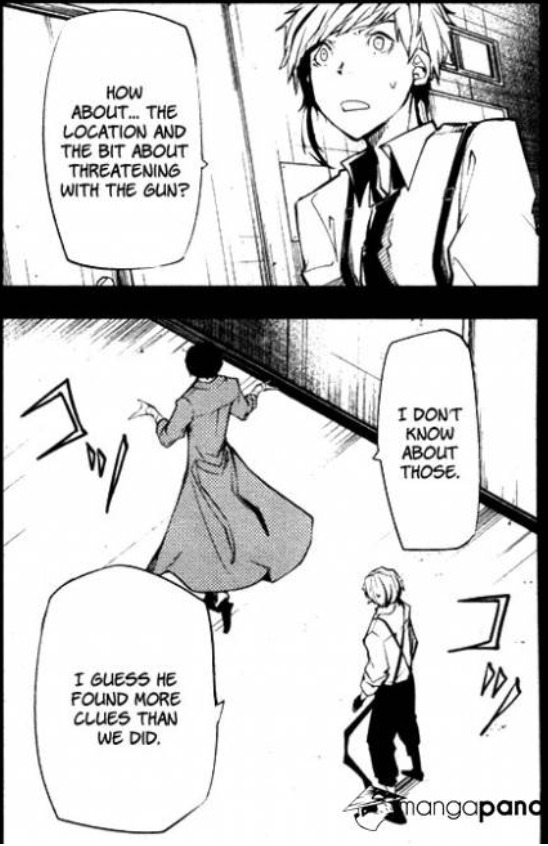
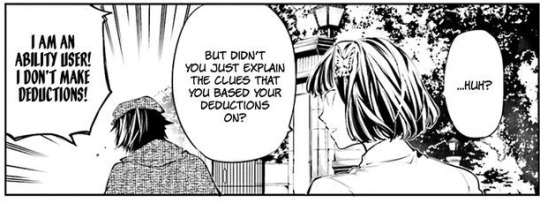
Even when a part of Ranpo’s reasoning is explained, there is usually something which is left in the dark and which we as readers accept as true because of Ranpo’s incredible ability to deduce things.
In short, what is really important for the series is not really to put some light on very complicated and very convulated plots, but rather to show the truth behind some human behaviours and why some characters chose to act in a certain way. This is usually the true focus of Ranpo’s cases, while the method used for the crime is something which comes second. The same can be said also about who the culprit is to an extent. In the case above there were not many suspects to begin with and in the other two cases Ranpo takes in the series we already know who the culprits and Ranpo’s opponents are.
So, we can say that what truly matters in BSD is the interiority of people and this is also why the protagonists are detectives. What they are really trying to do is to understand themselves and others and they do so as detectives which operate in a gray context. This is the symbolic meaning that the profession of detective has within the story.
In other words, the reason why Ranpo is so amazing is that he can see the truth in a complicated and ambiguous world:
This is symbolically shown by his act of wearing a pair of glasses when he is analyzing the scene of a crime.
However, this is only a superficial reading of Ranpo. It is correct in general, but it does not consider the character’s personal issues and journey.
The true essence of his character is that he is a paradox.
He brags about his ability being the strongest, but he is actually the only member of the agency without one. He can see through everything, but can’t really see through the lie he has accepted about himself.
However, what is even more interesting is the motivation of his behaviour.
On a first glance one could think that the reason why Ranpo keeps saying that he has an ability is the need of feeling special:

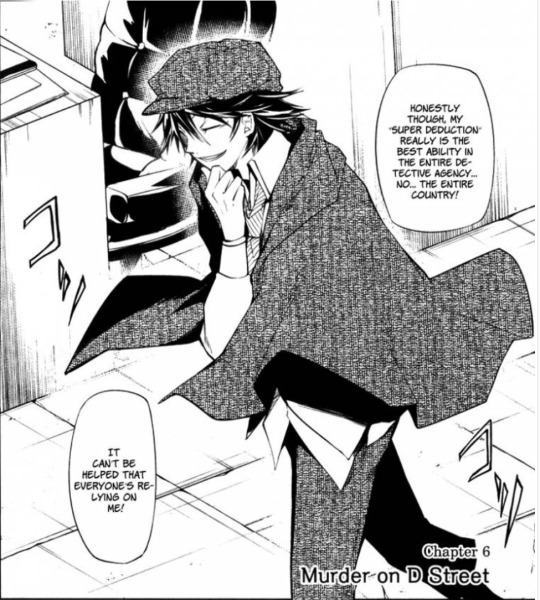
He keeps remarking how he is better than anyone else and how the world is about himself.
That said, his backstory reveals that it is actually the other way around. Fukuzawa told him that he has an ability not because Ranpo wanted to feel special, but because he wanted to feel normal. His intelligence makes Ranpo feel so isolated, that he needs to compartimentalize it and to make it overlap with something supernatural in order not to lose who he truly is.
Once this piece of information becomes known it is obvious that even the function of the glasses is actually the opposite of what one could think. They don’t make Ranpo metaphorically see clearer, but they actually limit his perspective. In short they are a symbolic “power-limiter”.
This is interesting for two reasons.
1) Ranpo is a foil to both Yosano and Dazai.
He is a foil to Yosano because they share a similar problem.
Both risk of being reduced to a single trait of their personality. Yosano is reduced to the one embodied by her ability, while Ranpo to his amazing deductive skills. Because of their talents they have both been feeling different and isolated and have risked to be exploited by others.
The solution is for both of them to go in a place which will see them as people and not as tools with attached practical functions.
In other words, in this scene:
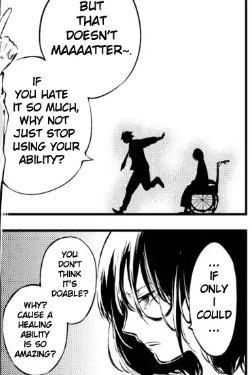
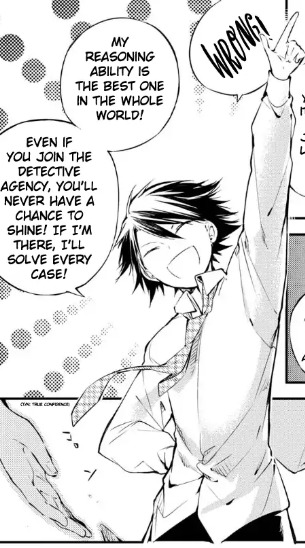
Even if Ranpo seems to be glorifying his ability and Yosano is despising her own, they are actually both coming from the same place. The difference is that Ranpo has already been given by Fukuzawa a feel-safe system he can use, while Yosano has nothing and is still struggling to find a better equilibrium. It is because of both this difference and this similarity that Ranpo understands Yosano well and knows what to say.
Ranpo is also a foil to Dazai since the two of them have risked to become isolated because they are smarter than others. What is more, they both met a father-like figure (respectively Fukuzawa and Mori) when they were almost at the end of their rope and were given a reason to keep going by these two men even if the methods Mori and Fukuzawa used were opposite.
Fukuzawa treated Ranpo as his own person and built a place made especially for him where he could use his talent without being exploited and made so that a virtuous loop was created in this way since the Agency ended up helping other troubled people.
Mori saw Dazai as a projection of his own self, nurtured his intelligence and groomed him to become his successor. He did not build a place for Dazai, but caught him in a criminal organization and used him to gain power in this organization and for the sake of the organization itself. What is more, Dazai ended up inacting a vicious circle since he, like Ranpo, brought more young people in the mafia (like Chuuya and Akutagawa for example).
In short we see once again in the way Ranpo and Dazai were treated by respectively Fukuzawa and Mori how the two men’s philosophies differ. Fukuzawa created an organization for a single person, while Mori used multiple people for the sake of a single organization.
2) Ranpo and Fukuzawa’s relationship perfectly expresses Fukuzawa’s personality and what his ability is about. As a matter of fact he basically did to Ranpo what his ability usually does to gifted members of the agency. He found a way to limit and so to “humanize” a part of Ranpo the boy probably regretted having. Fukuzawa gave him some breathing space, so that Ranpo could become better adjusted.
At the same time, this solution can only be temporary and the members of the Agency will one day have to face their abilities alone once again. Ranpo is in the process of currently doing so and in this way he is already ahead of his comrades.
POE VS RANPO: CHANGING PERSONAL NARRATIVES
Ranpo is given a new case to work on during the Guild Arc when he is challenged by Poe.
Their deduction match and their rivalry is meant to mirror both the one between Chuuya and Dazai and the one between Akutagawa and Atsushi and this is why the chapter dedicated to them is between the two soukoku’s team ups.
Like Chuuya and Dazai and Atsushi and Akutagawa, Ranpo and Poe are two old rivals who clash again as a result of both them being members of two different organizations and one having a grudge against the other.
However, their challenge shows perfectly how both Dazai and Chuuya and Atsushi and Akutagawa’s relationships should evolve. These rivalries should lead the people involved to recognize the other person and to better understand themselves.
This is exactly what happens in the chapter:
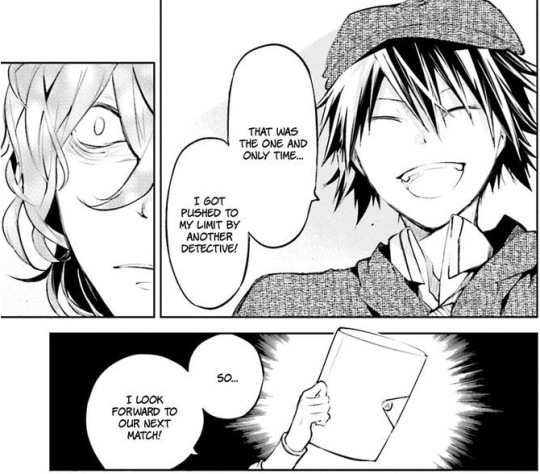
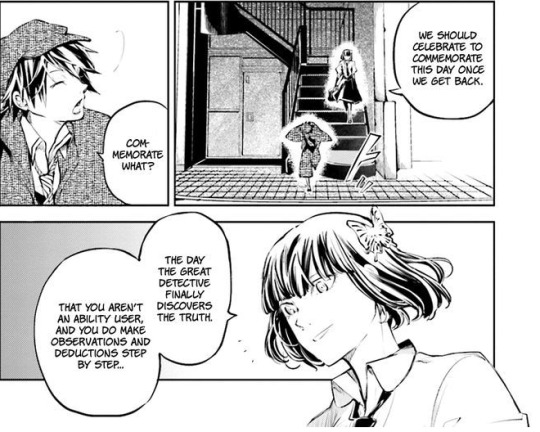
On one hand Ranpo aknowledges Poe as a worthy opponent and tells him not to give up and to keep challenging him.
On the other hand the whole experience makes so that Ranpo is forced to face a part of himself he has been running away from for the whole time.
In order to better understand this second point, let’s consider two things.
1) Poe’s ability.
2) The symbolic meaning of the “locked room mystery”.
1) Poe’s ability is interesting especially in a series which centers around literature and where there is a book which is able to change reality.
The Guild Arc is when the existence of this book is made known to the readers, so it is meaningful that in that same arc a character with Poe’s powers appears.
Writing is something which lets an author create many different worlds with different rules and readers are given access to those worlds thanks to books.
This is the basic idea behind both Poe’s power and the book. The difference is that Poe’s ability has limits and the worlds he creates are fictional ones and a person is able to escape them once the story is over, while the book is able to change reality for everybody and it is impossible to escape. So, both Poe and the book explore the idea that writing can be used to make one’s own wishes and ideas come to life. However, the book appears more invasive and forceful as if one’s perspective can be forced on everyone’s else, while Poe’s ability is simply a mean of expression.
As a matter of fact this is the kind of person Poe is:
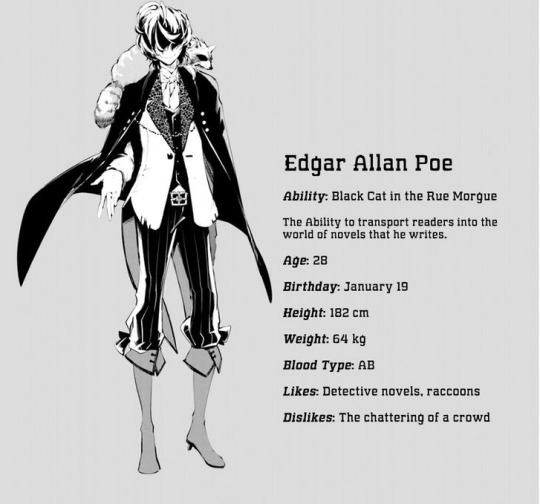
He is described as shy and has difficulty in creating new bonds. However, his power lets him transport people into imaginary worlds he himself created, so in a sense it is as if he uses his power to truly express his internal world. Because of this, it is meaningful that once Ranpo has experienced said world he accepts Poe as an equal and treats him far better than what he did in the beginning:

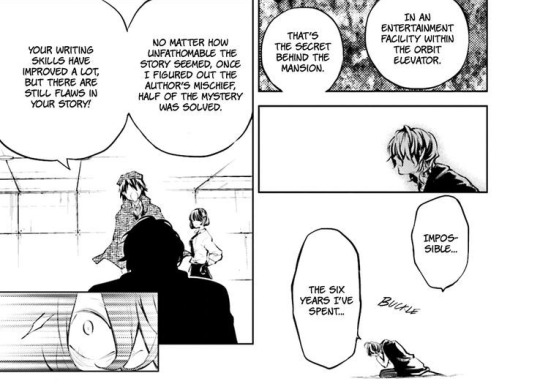
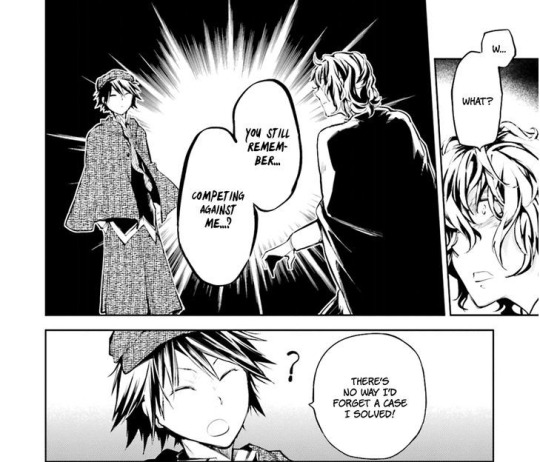
At the same time, Poe also forces Ranpo to leave his own personal narrative:

In his own personal narrative Ranpo sees himself as a great detective who uses his ability to solve crimes. However, in the world created by Poe there are no special abilities and even the glasses Fukuzawa gave Ranpo disappear:
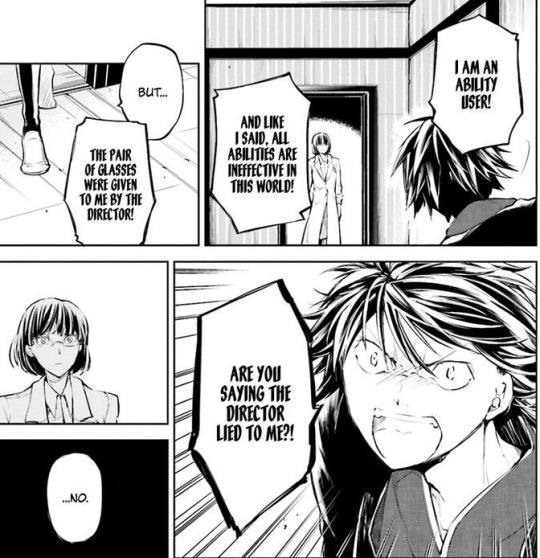
In other words Ranpo must accept to look at things in a different way if he wants to escape the book, but initially he refuses to let go of the coping mechanism the director gave him. This behaviour is a childish one and until Ranpo keeps clinging to it he can’t grow up.
However, he finally accepts the truth thanks to Yosano:
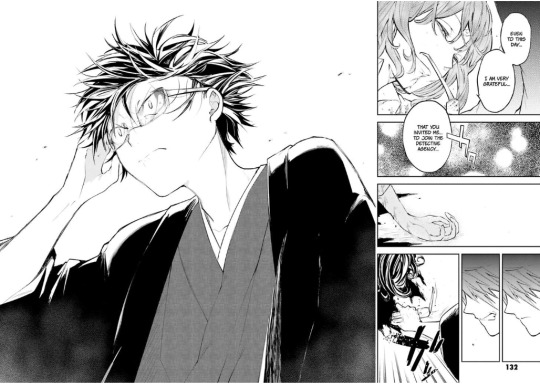
The act of using Yosano’s glasses to solve the case is a sign that Ranpo is accepting how others see him and so he is acquiring an ulterior perspective on himself. The reason why he is so attached to Fukuzawa’s glasses and to what they represent is because they are what makes him feel normal and protected. However, Ranpo has grown since Fukuzawa gave him the glasses and has now developed relationships with people who perfectly know who he is and have accepted him unconditionally.
It is also meaningful that Yosano is the one who makes Ranpo realize the truth because she is returning him a favor. After all, Ranpo helped her find a new home and made her realize that she is more than her ability and she is finally able to do for him something similar. As a matter of fact she makes him understand that his ultradeduction is an important part of him, but that she loves him not because of this ability, but because of the kindness he showed her when he invited her to join.
In short, Ranpo and Yosano save each other thanks to their friendship. At the same time, Ranpo and Poe help each other thanks to their clashing as the next point will make even clearer.
2) Locked rooms are used in the story to symbolize people being trapped in their own minds.
I have already explored the concept a little in this meta when it comes to Lucy’s ability:
Lucy’s ability is highly symbolic as well.
As a matter of fact Anne is clearly an alter-ego of Lucy herself. On one hand she is stronger than Lucy and will fight for her. On the other hand she also looks monstrous and scary.
These two attributes represent the fact that Lucy’s way of coping with her loneliness is a double-edged sword.
This is because Lucy’s solution is to basically find a refuge in her own head represented by her “room”. The room is a place where Lucy has basically complete control over things and where she can be the strongest, whereas in the real world she is weak and bullied.
However, no matter how strong she is in this world of her creation, she is bound to remain lonely exactly because she refuses to escape her own head and to truly connect with others. She chooses to bring people in by force instead and forces them to stay with her by catching them and collecting them as if they were dolls.
(...)
All in all, Atsushi and Lucy’s battle in Anne’s room is nothing more than a fight to force Lucy to open her mind.
As Lucy herself states she doesn’t know how to use the key because she doesn’t know how to healthily communicate with people and is not able to open herself up to others.
Of course the point is that in the end there is no magical key, but only Lucy herself can choose to go out from her mind.
If Atsushi and Lucy’s fight is one to force her to unlock her mind, then the one between Ranpo and Poe is a battle to unlock Ranpo’s one:
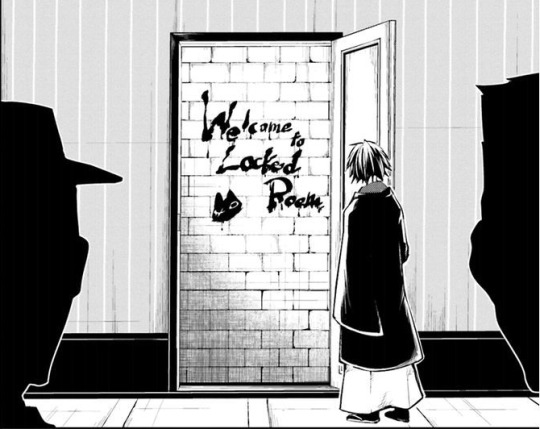
This is why the case is presented as a locked room murder when it is actually not. It is because the point is that the room can be easily opened and the mystery easily solved if the person is willing to choose so:
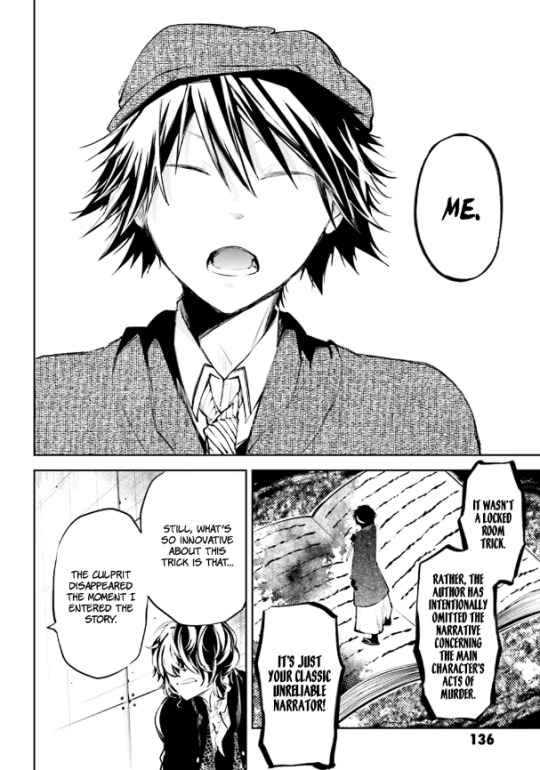
The culprit of the murder is Ranpo himself because he himself is the one who has been refusing the fact that he has no ability and in this way he has locked a part of himself up. He is an unreliable narrator just like the protagonist of Poe’s novel.
At the same time, Poe himself is said to be trapped in a room of his own creation:
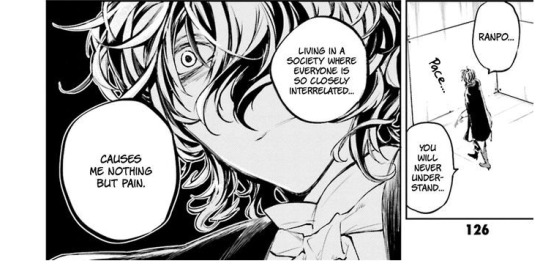
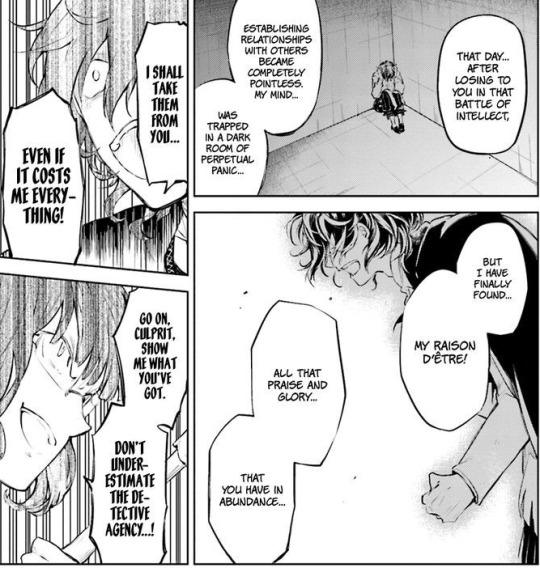
After having lost to Ranpo the first time Poe has grown isolated from the world as a reaction to his loss. However, thanks to Ranpo’s aknowledgment he is able to finally escape his own locked room and starts developing relationships with others once again. What is more, his friendhip with Ranpo is what motivates him into becoming an even better mystery writer.
In short, it is obvious that Poe and Ranpo’s match is an experience which has helped the both of them and their rivalry over mysteries is used by them in a constructive way. This is what Atsushi and Akutagawa will do in the future since their conflict must be used to make them leave their respective “rooms” and it is also what Chuuya and Dazai have the potential to do for each other.
THE PERFECT MURDER AND MURDERER: GRIEF AND JUSTICE
Ranpo has already made progress in his personal arc. He is the only one among his comrades who has overcome the security system given to him by Fukuzawa and he is now struggling by himself.
This passage is underlined even more by the fact that in Cannibalism Ranpo and the others are without their leader and must choose what to do on their own. It is not by chance that in such a scenario Ranpo is shown to be tricked for the first time since the beginning of the series. It is because he has now to face the limits of his deductive skills which are not an invincible ability. At the same time, he has this setback in a situation where he can not count on his main source of support because Fukuzawa is out of commission. However, this is all a part of the process of growing up and Ranpo has been doing great up until now.
That said, Ranpo’s failure during Cannibalism is what fuels him to take on another opponent aka Mushitarou.
The idea that he can fail and that he is at a disadvantage against an ability user is something Ranpo mentions more than once:
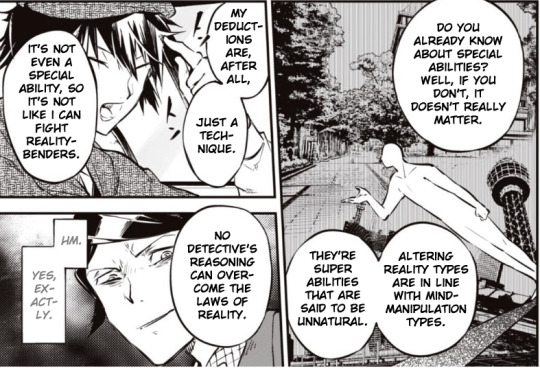
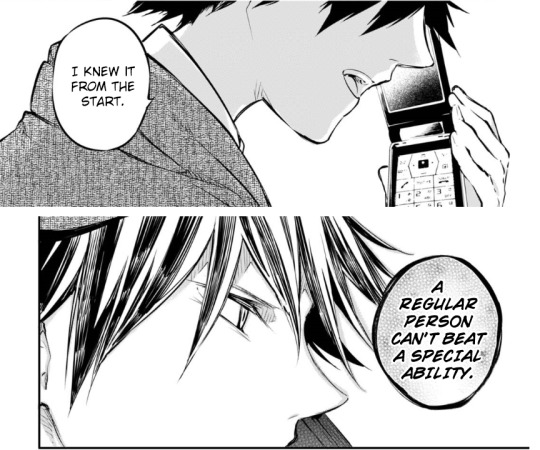
However, the second time he adds something interesting:

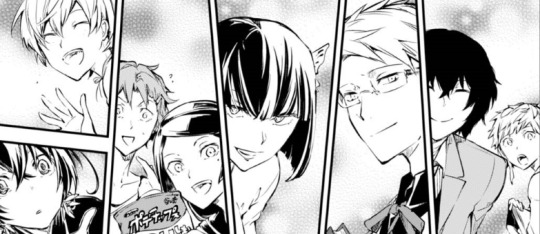
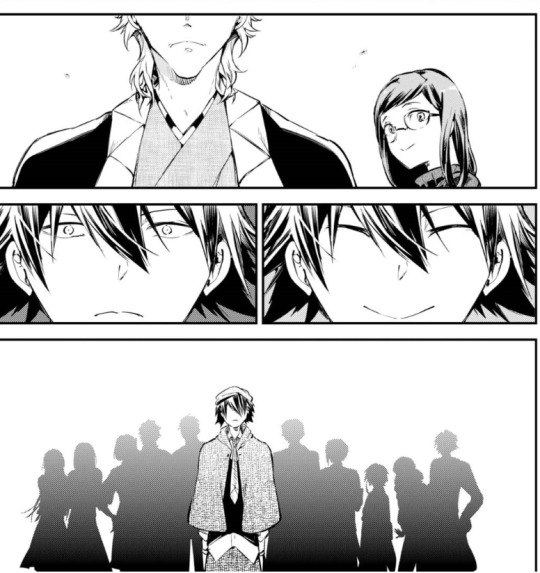
He says that he will still win because his comrades think that he is invincible.
The way the panels are drawn is interesting because it suggests that even if he acts as if he is taking strength from his comrades’ admiration, the opposite might be true and he might feel scared of failing and to let the others down which might end up with him ending up alone. However, this is only an idea which is suggested to me by the art and I think we should wait for more on this point.
That said, it is something which would make sense considering Ranpo’s backstory and which ties to what he says immediately after:
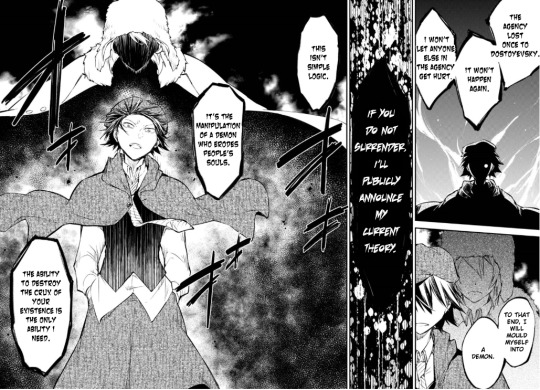
This scene compares Ranpo to Fyodor and so indirectly to Dazai too. After all, Fyodor and Dazai are often called demons or devils by others because they use their incredible intelligence to manipulate others and in this way they put distance between them and people. Here, Ranpo says that he is ready to do the same and partially does in the sense that he blackmails Mushitarou.
What is interesting is, though, that in this way Ranpo comes to embody two almost opposite concepts.
On one hand he is a genius whose intelligence risks to make him feel lonely.
On the other hand he is a normal person who can become invincible for his friends’ sake.
This fact highlights how often people tend to give too much importance to talents and to being special. All in all everyone is both special and a normal person in different ways and thinking that an individual can be only a deity or only an everyman is a simplification.
Moreover, Ranpo being a normal person who fights ability users makes him similar to Sigma:

And it ties to the idea of gray morality which is explored in the arc:
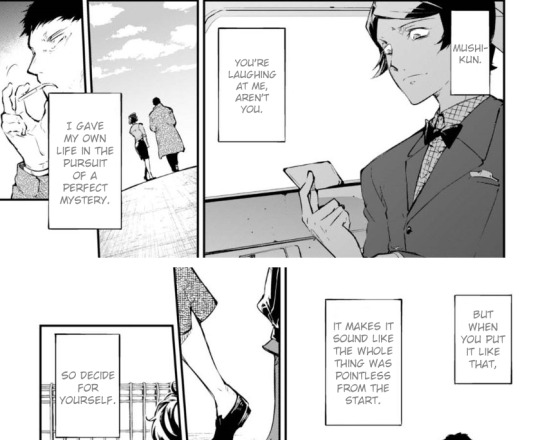
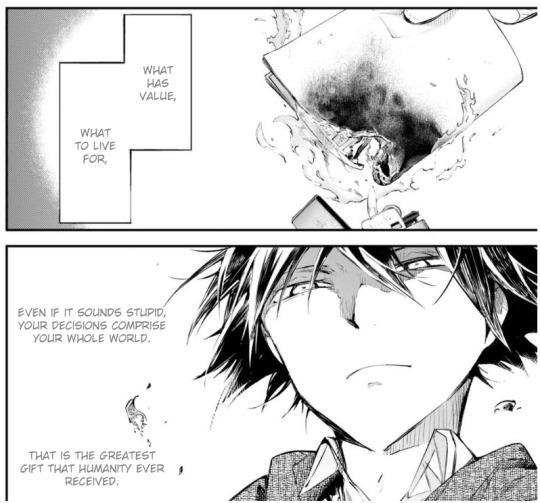
In the end there are not absolute truths, but this is precisely why living has meaning. People can choose to live the way they want and in this way their existences become full. So you can have everymen becoming heroes or monsters by their own volition because they have wishes or believe in something.
It is also important to say that Mushitarou Oguri is the same:

Ranpo is ready to become a devil for his friends’ sake and Mushitarou accepts to be a murderer for Yokomizo’s dream. Both are making absurd choices, but they do so without regrets and are firm in their convinctions.
At the same time, Mushitarou is important because when it comes to many themes the current arc is exploring.
Let’s talk a little about him and let’s start with his ability which, like Poe’s one, is similar, but different from the book:
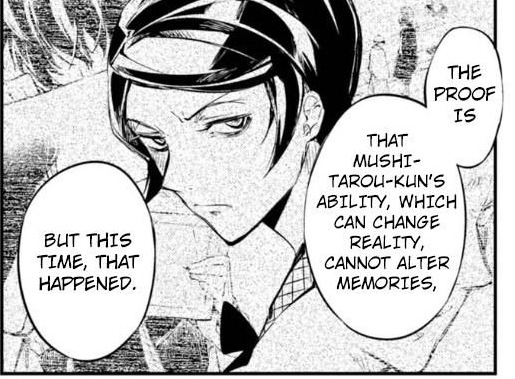

Like the book it can alter reality, but differently from it it can’t alter memories. At the same time, the book must obey the law of karma, while Mushitarou’s power seems to openly challenge said law since it has the potential of letting a person not be punished for their actions.
This last difference leads to some considerations on The Perfect Crime.
1) Mushitarou’s power is relevant when it comes to both his relationship and his foiling with Yokomizo:
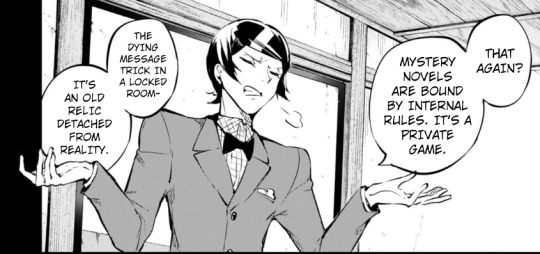
The source of their constant bickering is the fact that Yokomizo likes mystery novels, while Mushitarou dislikes them and considers them too formulaic. In short, the kind of mysteries Yokomizo can build on paper will never be good enough as the ones Mushitarou creates in the real world. In a mystery novel everything makes sense in the end, but in the real world it is not like this and Mushitarou’s Perfect Crime is symbolic of this. This is also why his proposals play with the tropes of the mystery genre:
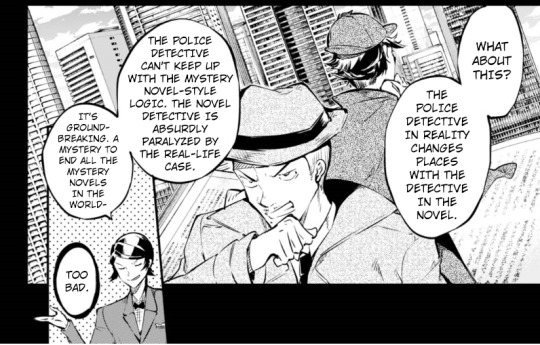
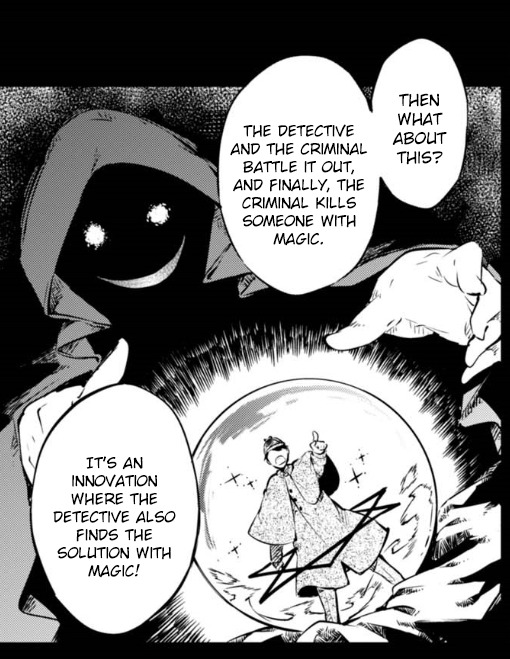
And ironically they resemble Ranpo’s battles against Poe (which was a meta-case) and Mushitarou himself (a case where the culprit uses “magic” to commit the crime).
In short, Yokomizo and Mushitarou are both obsessed by mysteries, but they have an almost opposite relationship with fiction. Yokomizo has lived and died for it, while Mushitarou dislikes it because it is irrealistic. This point will become relevant once again in the conclusion of this meta.
2) Mushitarou’s power is the opposite of “justice” since it lets a person escape the consequences of their crimes. In short, it seems the perfect power for a criminal and this is exactly how Mushitarou introduces himself:
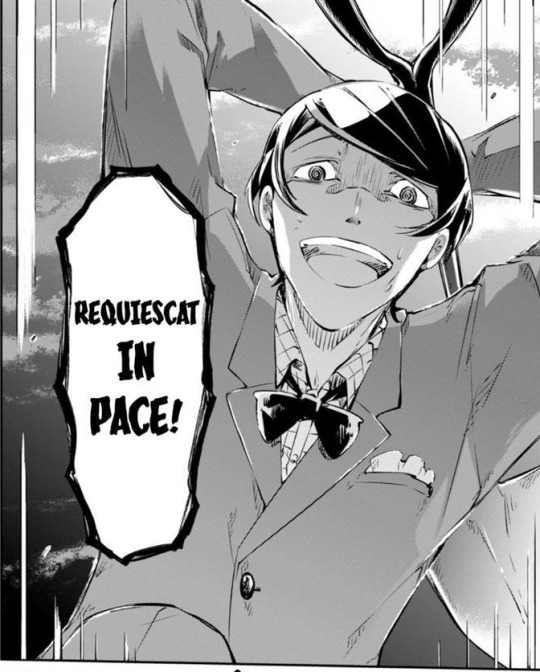
However, we soon discover this:
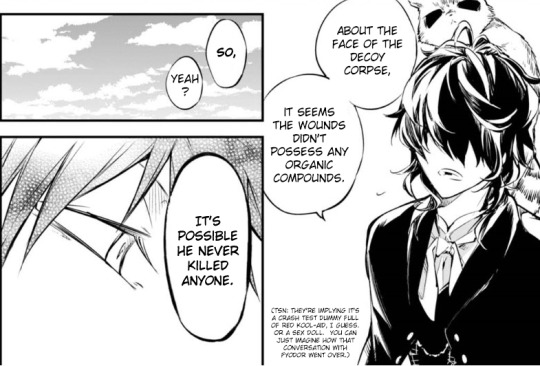
What is more, it is revealed that Mushitarou’s ability is the reason why Dazai was given a second chance in the first place and without it, he is soon arrested despite having already started a new life and having helped to protect Yokohama during many crisis.
In short, Mushitarou’s ability is an ability which is juxtaposed to the Hunting Dogs’ justice.
On one hand it is unjust that people can be criminals without being punished.
On the other hand it is also an ability which gives people second chances.
At the same time, Mushitarou’s personal story is paradoxical.
His power is perfect to make sure that a criminal is never caught, but Mushitarou who is an innocent man is imprisoned and forced to serve the government because of his ability.
This paradox is expressed also during Mushitarou, Atsushi and Kyouka’s escape when the three of them, despite being innocent, are forced to steal some money in order to go undetected:
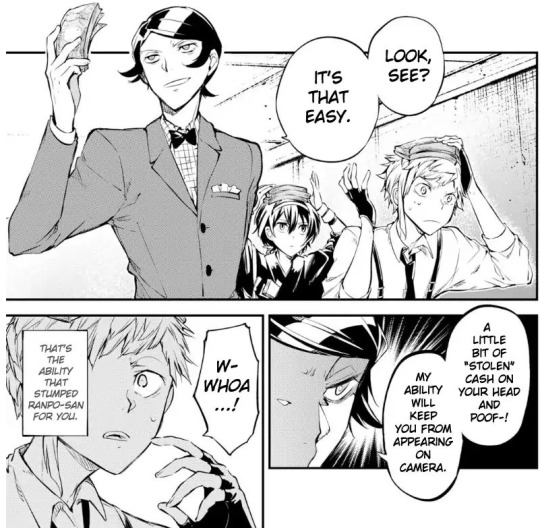
In other words Mushitarou’s story is another example of how society is corrupted and how people are more complex than their abilities.
In conclusion, we can say that Mushitarou’s ability is nothing more than an ability which erases a person’s presence. It deletes one’s mistakes and crimes as if they did not happen. This can be convenient, but at the same time it is also an ability which tampers with a person’s existence and hides parts of a person’s life.
This fits with Mushitarou’s personality since he wishes to stay secluded from society:
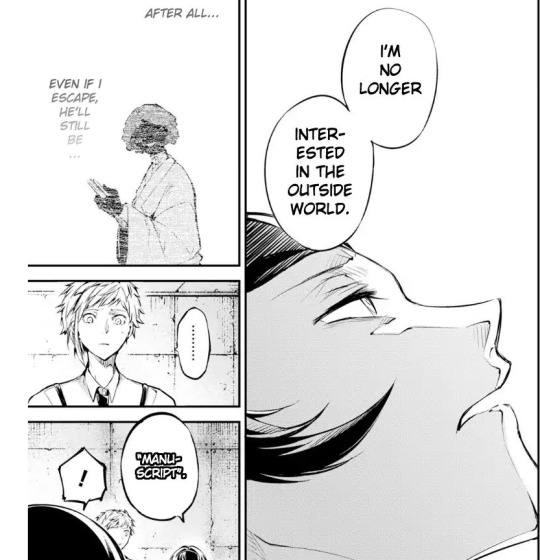
At the same time this desire of isolation and imprisonment is nothing more than another symbol of the fact that Mushitarou is another character closed in a locked room and that he must open the door.
In Mushitarou’s case, his locked room is symbolic of grief.
That is why the mystery Ranpo traps him in is a locked room mystery where he himself is the murderer (this situation is similar to the one Ranpo himself went through during his challenge with Poe):

And once again the only way to leave is that Mushitarou admits the truth, but in his case the truth is not really that he is guilty, but that he is innocent and that he has simply granted his best friend’s last wish:
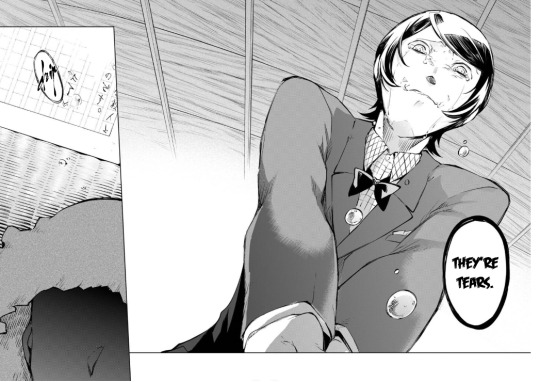
The thing Mushitarou has been trying to hide and to repress is the sense of grief he feels for Yokomizo’s death. This is what his tears are a metaphor of even if the story gives him a practical reason for him to keep them hidden.
In other words, his battle with Ranpo makes so that Mushitarou is finally able to start to process his grief by at least being able to admit it.
When we meet him later on, we see that he is more open about his feelings even if he is still repressing them to an extent. However, the main problem is that Mushitarou is not really able to solve them in a constructive way. This is why he initially doesn’t want to leave his prison and so he has put himself in a locked room once again.
Even when he escapes he is still shown to be struggling not only with the fact that he misses his friend, but also with the fact that he is starting to move on:

It is in order to overcome these contrasting emotions that he is given by Poe a new coping mechanism:
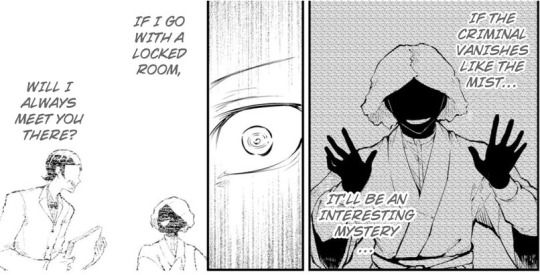
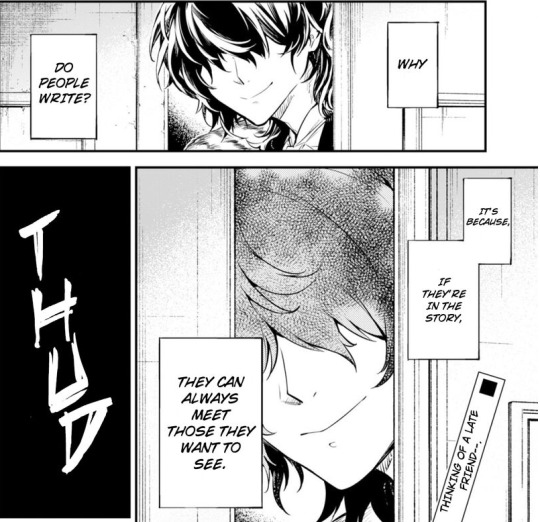
Thanks to fiction Mushitarou is working through his grief in a much healthier way than before. Yokomizo will always be in a locked room aka in Mushitarou’s heart and mind. Mushitarou has just to learn to freely go in and out from it without ending up trapped. This is what him writing mystery stories will be about. This activity will most likely become a key to his personal locked room.
This section should have made clear enough the importance Mushitarou has thematically for the current arc and at the same time it should have showed at which point Ranpo is in his personal journey.
However, there is still a last thing to consider when talking about Ranpo and his two rivals and I will talk about it in the last part of this analysis.
FICTION AND REALITY
As stated in the two previous sections, both Poe and Mushitarou’s abilities are similar and yet different from the book and this is because these two characters are together with Ranpo used to explore some themes linked to fiction in general and to its links with reality.
First of all, let’s highlight that both Ranpo and Mushitarou don’t like mystery novels in contrast with Poe who writes and loves them:
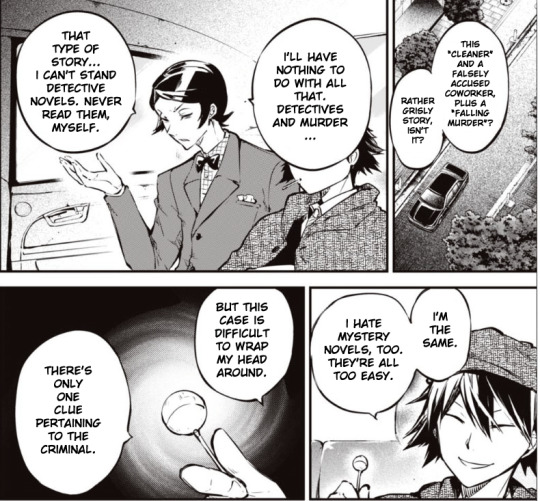
The reason why both Mushitarou and Ranpo dislike books is that they are too simple and end up being different from reality.
This is also what it is stated about the book:
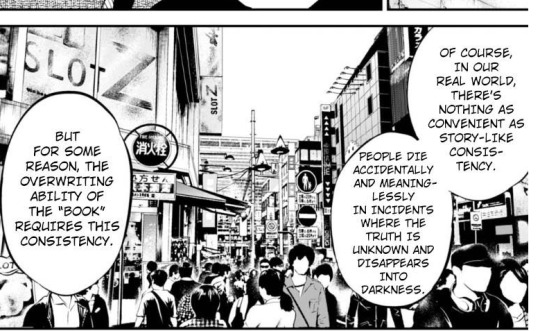
Reality must not make narrative sense and people can die without a reason which should not happen in a well structured story where characters must convey something.
In short, fiction is not reality, but ironically both Ranpo and Mushitarou who look down on fiction have grown a lot precisely thanks to it.
Ranpo especially has been able to take a huge step in his development after years of stagnation thanks to the artificial mystery created by Poe. What is more, he has been relying on Poe’s ability since then and has used it against opponents he could not have beaten on his own (like Chuuya and Mushitarou).
It is also interesting that both times Ranpo’s opponents ended up in a setting which challenged them by playing with their flaws. As it was shown above, Mushitarou had to admit his feelings for Yokomizo, while Chuuya who relies on his power too much found himself in a world without abilities.
These two situations occurred because Ranpo needed to win against his opponents, but at the same time he has been using Poe’s power which is representative of fiction in general to challenge people in a way which could have helped them grow.
This is one of the uses of fiction Ranpo has (even if maybe just uncounsciously) come to accept. Fiction can teach people that there are different ways of approaching a problem and they can learn something new about themselves or reality by consuming it.
At the same time, the relationship between fiction and reality is more complex than what characters like Mushitarou think. After all, this is what the idea of the book is about since it is an object which can change reality, but which obeys the laws of fiction.
Even the above mentioned ideas Mushitarou has to transform the mystery genre can be used to emphasize exactly this.
As I have written above, those two ideas can be compared to Ranpo’s match against Poe and to the one he has with Mushitarou himself.
However, it is interesting that the solution of both cases is different from the one Mushitarou talks about.
In the first instance, Mushitarou thinks that the real detective and the fictional one would both find themselves at a loss because they would have to investigate in different worlds with different logics. However, Ranpo managed to solve the fictional case just fine and he also ended up discovering something about himself while doing so.
Similarly, Ranpo manages to win against Mushitarou not because he has an ability, but simply by using his intelligence and this once again proves how reality does not adhere to a genre and different and creative solutions can be found.
Later on, Mushitarou himself realizes that fictional creations can be useful to face real problems:


A cheap trick about a locked room which Mushitarou has always considered irrealistic is what ends up saving him in a dangerous situation.
In short, I hope that these examples make clear that these three characters are used to tackle some themes related to stories and narratives.
Poe is the character who most than anyone else appreciates fiction and uses it as a way to communicate and to express himself.
Mushitarou does not like fiction, but is slowly being saved by it.
Finally, Ranpo is an in-between since he, like Mushitarou, thinks it is too simple, but he has been able to use it to make another person grow exactly like Poe used his power against him and ended up helping him in the end.
CONCLUSION
We can say that Ranpo’s character is extremely important for the story from a thematic point of view.
-He is the symbol of the agency and his personal arc is an example of what all the other characters (in different ways) will have to go through (becoming indipendent from a father figure).
-His investigative skills are not really about solving mysteries, but more a symbol of the importance of observing the world and of accepting and understanding its complexity. This is something even a normal person can do and it is at the same time the best ability of all.
-His cases are used to explore themes important for the series and for specific arcs.
-His character and the ones of his opponents are used to explore themes related to fiction and its link to reality.
#bsd#bsd meta#bungou stray dogs#edogawa ranpo#ranpo bsd#edgar allan poe bsd#oguri mushitarou#bsd mushitarou#my meta
321 notes
·
View notes
Video
youtube
Why Buffy the Vampire Slayer is Important - 05/09/2020
Buffy the Vampire Slayer is a very important piece of fiction. No, I’m not talking about the groundbreaking television series that premiered in 1997, ran for seven seasons, and spawned a spin-off that ran for five (I’ll get to that some other time). I am referring to the redheaded step child of a movie from the early 90’s that came before it. The movie version of Buffy the Vampire Slayer is one of the most important vampire movies ever made. I will also say that it is pretty clearly not the best vampire movie ever made, but it’s impact on the genre continues to be felt on the big screen, and most importantly on the small screen, even to this day.
Released in July of 1992, Buffy the Vampire Slayer was directed by Fran Rubel Kazui, and the screenplay was written by a then young unknown writer named Joss Whedon. The concept that Whedon had come up with was brilliant. After viewing many monster movies before where the young blonde girl walking alone in an alley would get killed by a horrible monster, Whedon thought it would be a pretty fun idea to see a movie where the young blonde girl was getting stalked by a creature like a vampire, and it would instead be the girl that would turn around and kick the vampire's ass. It was a brilliant concept that Whedon would later explore and perfect in the Buffy the Vampire Slayer television series, however, the movie adaptation of his work would first prove to be a flawed, but still entertaining, execution of the concept.
The main plot of the movie is of course about a young blonde girl named Buffy, played by Kirsty Swanson, who is told that she is one of the rare chosen ones who has been gifted with the powers to fight and slay vampires. Guided by her watcher Merrick, played by Donald Sutherland, Buffy learns and trains how to slay vampires, while also receiving help from a rebellious young man name Pike, played by Luke Perry. Rutger Hauer plays the main vampire Big Bad Lothos, with his vampire minion Amilyn, played oozingly well by Paul Reubens, who has a scene stealing death that continues even into the credits. David Arquette has the fun role of Benny, who is Pike’s best friend who gets bitten and turned into a vampire in the first half of the film. There’s even a quick cameo by a very young Ben Affleck.
Now, to address the major criticism of the movie, the main failing of the movie is one of direction. The script was good, the cast was decent, and the concept was solid, but Kazui’s direction just didn’t mesh well with the original intent and tone of Whedon’s story. Whedon even expressed his frustration while they were making the movie in a behind the scenes video, saying of the movie that “It was funny when I wrote it.” Whedon was so frustrated by how much of his vision was being mishandled and re-written, that he eventually left the set during production and never came back. This frustration would later lead to Whedon wanting to explore the concept further on his own terms with the eventual television series on the new WB network. The television series would later go on to become the best genre television show of all time, but as I said before, that’s a topic for another discussion.
One major thing about the movie that really stands out to me every time I watch it is just how slow the fight scenes are. It looks like everyone is fighting in slow motion and have little actual skill when it comes to fighting, even though some of the vampires are supposed to be hundreds of years old, and should know how to fight. This makes it hard to take the action parts of the movie very seriously. If you ever want to see how not to do an exciting fight scene, then watch this movie.
There was clearly an evident clash of styles and ideas with the writing and directing when it came to making this movie. Kazui wanted the film to be lighter in tone than what was written in the script. Kazui appeared to want to make a seemingly funny and not very serious movie that happened to have vampires in it, while Whedon wrote a serious vampire movie that also happened to be funny. Whedon obviously had the better and right idea, since the serious and darker moments of the film tend to carry more weight and interest for the viewer, while the humorous elements seem to fall flat and a bit out of place. Most genuine laughable moments tend happen because of how bad they are.
Now, that’s not to say that there aren’t a few scenes that don’t give me a chuckle. Future star movie David Arquette’s charisma shines through whenever he’s on screen, and he does a terrific job at playing the recently turned vampire of Benny. He and Luke Perry have great chemistry together whenever they are on screen, and they share some of the film's most genuinely humorous scenes. The most laugh-out-loud moment of the film also has to be when Buffy stakes Amilyn, and Paul Reubens then proceeds to improvise the single greatest vampire death scene in all of cinema. The humor of Buffy is there, but it ultimately just wasn’t brought to its full potential with the film.
The darker elements of the film also have their place, even if they are downplayed more for a lighter overall tone. In Whedon’s script, Merrick was originally supposed to kill himself to prevent from being turned a vampire and revealing to Lothos who the Slayer is. The dream sequence of Buffy with Lothos also has a nice eerie feel to it that I wish was dialed up more through the film than in just this one scene. The big vampire fight at the dance in the climax of the film was also supposed to result in Buffy burning down the school gym. This detail, while omitted from the movie, would later be included in the television series as Whedon would retcon the backstory to his original script.
There is one aspect of the film that I think is truly perfect, and that’s Kirsty Swanson’s portrayal of the main character herself, Buffy. She plays the ditzy blonde valley girl stereotype very well, which is exactly what Whedon was going for in his original concept. While Sarah Michelle Gellar would prove to be the perfect Buffy for Whedon’s later television series, Kirsty Swanson proved to be the perfect Buffy for what this film wanted and needed her to be. She has her blonde California valley girl moments, but she also shows a strong personal character growth throughout the film. Swanson would also receive the film’s only award nomination, which was for Best Actress for the Fangoria Chainsaw Awards. Not exactly the Academy Awards, but still the only form of recognition that the film received upon its release.
Even for all the rewriting and adlibbing that Donald Sutherland did on his own to his watcher character of Merrick, he is still a great actor who plays the part well enough, even if he had little respect for the material. He maintains that older presence of a mentor that Buffy needs, and is one of the few serious and less comedic parts of the film. Donald Sutherland also hated the title of the film, so he was probably doing everything that he believed to make the movie better than what he thought it was, and the director would let him do whatever he wanted. It wouldn’t be the first instance of someone dismissing Buffy the Vampire Slayer just because of the title alone.
For all of the movie's missteps, they serve to illustrate how a movie of this genre should not be handled and can later be improved upon in the television series and other works of the genre. The good aspects of the film also show what can work in the genre when it’s done right. The first season of the television series would also experience some of these growing pains when trying to find just the right balance of horror and comedy. The importance of this movie is that it is essential in laying the groundwork for future vampire stories to come, and the high-school-is-hell metaphor. It basically further helps to define the teen vampire genre that was started with The Lost Boys in 1987 and continues to this day.
The movie is always going to be overshadowed and overlooked by the vastly superior television series, but it still holds an important place in the history of the vampire genre. While the more lighthearted take of vampires in it may have prevented it from becoming a true classic, it also makes it a good movie for younger kids to watch and to be introduced to the genre at a young age. This is a very important aspect of the film to remember, and it cannot be overlooked. It was a favorite of mine to watch when I was a younger kid growing up, and it certainly led me to the superior works of the genre, including my favorite television show of all time. Without this movie, we would never have gotten the great television series of the same name, and for that reason above all, the Buffy the Vampire Slayer movie will stand the test of time as being significantly important to the vampire genre.
17 notes
·
View notes
Text
Star Wars Jedi: Fallen Order-Review
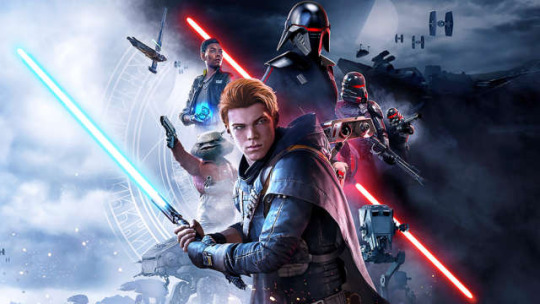
Respawn Entertainment breaks an over decades long curse and delivers a phenomenal, if rough around the edges, Star Wars experience.
(Review contains minor spoilers)
youtube
Cal Kestis (Cameron Monaghan) is a Jedi survivor of Order 66. Having survived the traumatic first stage of the Jedi Purge, Cal has spent the last several years on the fringes of the galaxy, keeping his head down and avoiding detection by the Imperial warmachine and their fearsome enforcers. However, when Cal uses his Force powers to save a friend in danger, he draws attention to his relatively normal life and he is soon once again on the run from the Imperial Inquisitorius. Luckily, he is found by two other renegades, former Jedi Cere Junda (Debra Wilson) and crotchety ship captain Dreez Gritus (Daniel Roebuck), and offered safe harbor. It comes with a catch though. Cere needs Cal to unlock the secrets of a potential list of new Jedi hidden by her former master, Eno Cordova, and scattered throughout the galaxy. Cal and Cere have their own secrets though and a deadly Inquisitor follows them at every step.
It’s been a long time since there has been a good Star Wars video game. At least, a single player experience that rewards with story in addition to gameplay and visuals. This decade has already been pretty sparse in offerings after the comparatively abundant 00’s, but even more so for those hoping for some kind of narrative from their gaming trips into the galaxy far, far away. Sure, 2017’s Battlefront II offered a short and deeply flawed campaign, but for anything more substantial we would have to look back to 2011’s The Old Republic MMO or 2010’s sloppy sequel to The Force Unleashed. For a franchise that offered some of the best experiences in the action adventure genre several generations ago, Star Wars was struggling to make its mark in this medium even with the pure abundance of film, comics, books, and TV offered each year.
Luckily, Star Wars Jedi: Fallen Order is a success. It’s a profoundly satisfying experience for Star Wars fans in addition to just being a rewarding and joyful gameplay experience. It may not be perfect, and it is certainly rough around the edges, but Respawn Entertainment has created a Star Wars experience that is among the best out there.
Much of this comes from Fallen Order’s outstanding narrative and story direction. Game director Stig Asmussen and narrative lead Aaron Contreras have spun a Star Wars tale populated by endearing and compelling characters, filled with interesting mysteries, and even populated by a few trademark Star Wars twists.
Cal Kestis, despite his profoundly bland character design, quickly establishes himself as an engaging protagonist and player stand in. Due in large part to Monaghan’s performance and a strong direction, Cal is a character that has experienced world shattering trauma, but is still fundamentally good hearted and courageous. Much of Cal’s arc becomes one of finding purpose in a new, much darker, world while also coming to terms with the violent events of his own past.
Trauma and its effect on a cast of people trying to survive a cultural genocide is a major theme of Fallen Order throughout. The majority of its central characters, light and dark, are survivors of the climactic events at the end of The Clone Wars and their methods of coping often end up shaping their personal narratives but also the trajectory of the plot. Of these, Cere proves to be the most compelling. Played with incredible nuance by Wilson, Cere is an atypical Jedi mentor that wishes to guide the future generations of the Force, but is just as often plagued by her own trauma, which frequently manifests in ways that are unhelpful or potentially dangerous to her pupil. Her journey at times even eclipses Cal’s and is frequently filled with moments of triumph and great sorrow.
Despite its male protagonist, Fallen Order is filled with a cast of compelling and dynamic women characters with Cere just being one of the most notable. The game’s primary antagonist, The Second Sister, has a tragic story of her own, which slowly changes and recontexualizes the events of the game as the story continues. Most fun however proves to be a surprising late addition to Fallen Order’s party of protagonists who adds a fun wrinkle to an extended part of the Star Wars mythology.
Any discussion of the game’s characters wouldn’t be complete without the endlessly endearing BD-1. The best droid companion this side of BB-8, BD-1 in typical Star Wars fashion is equal parts friend and McGuffin, and is often key to some of the game’s best story telling moments.
Fallen Order’s narrative direction is often its best tool. Respawn blends gameplay, cut scenes, and interactive exploration to evolve a story that reaches surprisingly affecting emotional beats before headed into one hell of a finale. The fact that Stephen Barton and Gordy Haab have crafted a new Star Wars score that feels a part of the franchise, but also infused with its own themes and identity certainly helps. Cal’s theme is a new classic for the saga and it’s even more infuriating that we don’t have a release for this music a month after launch. It makes for a narrative that is fun to savor, hard to put down, but also lingers far after conclusion. I can’t recall the last time I missed characters this much after putting down a controller and I’m very eager to return to the world that Fallen Order has spun.
Now time for a confession. I have played video games my entire life and I have very fond memories of all kinds of games. I love action adventure games and my most fond gaming memories of the last decade have been from Mass Effect and Uncharted. I’m also very, very bad at them. It may be my dysgraphia, which makes hand eye coordination very difficult, or it may just not be in my skillset, but I often find even the easiest games very difficult.
So when, Fallen Order announced that it would be taking inspiration from notoriously difficult games such as Metroid or Dark Souls, I was suitably worried that it was going to leave my flustered and confused despite really enjoying the adventures of Samus Aran.
What Respawn has done with Jedi: Fallen Order is take key elements and concepts from numerous other games and spin them together in a tight and exciting package. Those familiar with each genre of game are likely to see what Fallen Order does as a considerable pairing down. It ends up being a sort of gameplay smoothie of Uncharted, Dark Souls, and Metroid in an experience that blends all well, but doesn’t come close to being among the best in the genre for any of its many inspirations.
This may sound like a criticism, but for the larger experience that Fallen Order crafts this ends up working to its benefit. The puzzles in its Zelda like temples are never enough to stump you, but encourage you think outside of the box. The climbing and exploration is free flowing and easy to navigate and offers frequent narrative rewards for players that are ambitious enough to explore. The sheer amount of optional locations in Fallen Order is impressive and it’s easy to find yourself falling down amusing rabbit holes that easy could have been blown past on quicker playthroughs. It says something that this is the first game where I’ve actually felt compelled to hit that little 100% complete marker before running for the final boss encounter.
The combat itself is amusingly layered and just technical enough to feel like it takes mastery. Refreshingly, Respawn goes the opposite direction of other recent Star Wars adventure experiences and avoids falling into mindless power fantasy. You won’t be crushing AT-ST’s with waves of telekinesis or leveling rooms with storms of Force Lightning. You are encouraged to treat each combat encounter with the mentality of a vulnerable, if skilled, Jedi. Rushing in blindly will likely get you killed quickly. Measured blocking, dodging, tactical strikes, and creative employment of Force powers is the way to success and it leads to a combat experience that may seem familiar for fans of Souls games, but also feels very in tune with the spirit of the franchise.
Similarly, the leveling system is tied more into emotional discovery and personal acceptance. It avoids making the power system in Fallen Order too much of a gamification of the Force and helps keep the spiritual and emotional aspects intact.
That being said, there is some weirdness to it all. For the amount of effort put into making sure that gameplay matches the feelings of Jedi philosophy and mentality, the fact that murdering rooms full of enemies is often the only way to progress can feel a little jarring. Incorporating some form of stealth or noncombat alternative for certain sections may have been beneficial and even more in keeping with the larger goals of Respawn and Fallen Order’s narrative.
There’s also just a general bugginess to Fallen Order. Enemy AI can behave in ways that are often very strange and counter intuitive to their own survival. Graphical pop ins and oddities are frequent. Powers occasionally don’t work in ways you would expect them to. The environment occasionally drops out and leaves you stranded behind a rock or underneath a pool or puddle. Few of these are game breaking and are often few and far between, but it can be jarring and frustrating when they are appear and often take you out of what is normally a well-crafted experience.
As a whole though, Jedi: Fallen Order may be the best Star Wars gaming experience in a generation. Its heartfelt narrative and smart gameplay make for a strong and frequently stellar experience. It has its problems, but they are hardly enough to discourage from joining Cal and his allies on this adventure. Grab a lightsaber and head on in. It’s a journey worth taking.
Score: A-
11 notes
·
View notes
Text
Loss of Self: When Identity Theft Gets Extreme
A 1956 movie, Invasion of the Body Snatchers, seemingly introduced a fresh horror into our collective consciousness: An alien race that could infiltrate a community, quietly replacing its members, without anyone noticing....except maybe for the last person left, who realizes far too late that there’s nowhere left to turn.
Body Snatchers itself drew its inspiration from a novel written two years earlier by Jack Finney. In the book, as in the films that followed, a plant-based alien race descended from space with seed pods that could grow a perfect duplicate of a human -- right down to the scars and memories. But these duplicates had no emotions, no mode of reproduction, and they were doomed to die within five years, ultimately setting the earth on a path for destruction.
Finney’s story ultimately ends on an optimistic note -- the aliens depart, finding humans more resistant than they expected -- but later treatments of the story would take a darker turn.
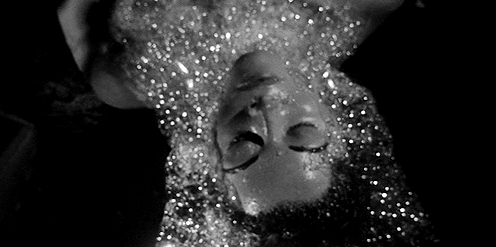
Body Snatchers wasn’t the only story of its time to wonder about extraterrestrial invaders and body-thieving threats. Robert Heinlein, Ray Bradbury and Philip K. Dick are among the authors who touched on the concept of mind control and silent invasion.
Arguably, the folkloric roots of Body Snatchers trace all the way back the European fairy stories about changelings. According to these tales, the fairies would at times steal humans (usually children, but not always) and replace them with impostors. There are also ancient tales of demonic possession and witchcraft where non-human entities would take hold of townspeople.
These folktales differ in a few vital ways from the genre Body Snatchers would come to codify, though. For one, the impostor could usually be identified quickly by a change in behavior. For another, incidents would occur in isolation, affecting individuals rather than whole communities.
In encapsulating specific, timely fears, Invasion of the Body Snatchers created something both wholly familiar, and utterly new.
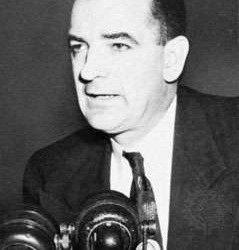
In 1950, senator Joseph McCarthy rose to prominence after making claims that Communists had infiltrated all branches of the government. For four years, he waved an investigation that ultimately failed to turn up any evidence of spying -- but it did destroy careers, tarnish reputations, and sow seeds of doubt throughout the country as neighbors turned suspicious eyes on one another: https://www.history.com/topics/cold-war/joseph-mccarthy
With McCarthyism fresh in the pop-cultural memory, it’s not too tough to see why a story about outside invaders living among us would be so uniquely terrifying. But the enduring power of Body Snatchers goes deeper than Red Scare anxieties. It also taps into our own insecurities by asking the most troubling question of all: What if someone else stole your body and your life...and lived it better than you did?
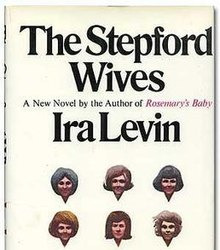
In 1972, author Ira Levin wrote a darkly satirical novel, The Stepford Wives, about a young mother who begins to suspect that there is something deeply wrong with the apparently idyllic neighborhood she moves into with her husband. The other wives are beautiful and submissive, with no interests or desires beyond pleasing their spouses.
The explanation? The wives have been replaced with robots. What happens to the originals? That’s open to interpretation. Ira Levin’s novel never gives an explicit answer, although it’s implied that they are killed and disposed of -- a fate made clearer in the 1975 film adaptation. In a future film treatment, the Wives are merely mind-controlled (making salvation possible, and softening the horror of the story).
Obviously, Levin’s work is born in the heart of the Women’s Liberation movement, and the feminist themes are explicit. But it is a clear spiritual successor to the anxieties raised in Body Snatcher: the price of conformity, the loss of self, the duality of community and the slow, creeping horror of the world changing around you beyond your awareness or control.
That Invasion of the Body Snatchers would be remade in 1978, then, seems almost inevitable. Our culture was redefining itself in every imaginable way, and the anxiety surrounding displacement was higher than ever.
A Real Terror...
An especially chilling aspect of the fear behind Pod People and Stepford Wives is that, for some people, it’s a reality.
The Capgras Delusion(1) is a psychiatric disorder where a person comes to believe that one or more people in their life has been replaced by an impostor. The delusion most commonly affects people with dementia and schizophrenia, but it can be triggered by a brain injury or other cause as well. It can be acute or chronic, but it leaves sufferers with the certainty that their spouse, child, parent, or even pet is a stranger, despite all evidence to the contrary.
The disorder was originally described by French psychiatrist Joseph Capgras, who identified it in a patient in the 1920s. It’s probable that it, or something like it, has occurred throughout history as a result of certain brain injuries or the onset of dementia.
Sadly, little is truly known about the causes or treatment of the delusion, and some sufferers will struggle with symptoms for the remainder of their lives. That is a truly chilling thought.
Looking for More Stories About Replacements?
There are plenty of stories out in the world of replicants and replacements. Here are three of my favorite recommendations to whet your appetite.
The Faculty - This 1998 film directed by Robert Rodriguez takes the concept of a slow-moving alien invasion and moves it into a high school. Here the aliens are parasites, and the unlikely hero is a drug-dealing delinquent. What makes the film memorable is the subtle menace of the teachers, especially the performance of Robert Patrick, and the clever treatment of high school archetypes. Who hasn’t felt that their teachers might be pod people?
The World’s End - Edgar Wright directed this film in 2013, and it serves as the ending to a trilogy loosely made up of Shaun of the Dead and Hot Fuzz. The story follows a group of old friends reluctantly going on an epic pub crawl, only for it to be rudely interrupted by the realization that the town has been overtaken by robots. What makes the film truly excellent is how well it works as a story before the reveal: the tale of friendships that have fallen apart and the ravages of nostalgia is plenty riveting on its own. Here the robots can be viewed, perhaps, as a metaphor for growing up and joining mainstream society...and a question about whether such conformity is ever worth the price.
Get Out - Much has been said of Jordan Peele’s 2017 debut, which follows a young black man anxiously meeting his white girlfriend’s family for the first time, only to discover a truly sinister explanation for some of the strange things he encounters. The story is a clear call-back to The Stepford Wives, replacing race for gender and exploring those themes to their logical and horrifying conclusions.
Do you have a favorite body-snatcher story? Reblog and tell me about it!
Read More:
1. https://en.wikipedia.org/wiki/Capgras_delusion#targetText=Capgras%20delusion%20is%20a%20psychiatric,replaced%20by%20an%20identical%20impostor.
#horror movies#horror#analysis#horror analysis#literary analysis#pod people#invasion of the body snatchers#stepford wives#aliens#invasion#parasites
14 notes
·
View notes
Text
Which Side is Most Likely to Go Dark - Analysis
We’ve all heard the story - The hero, disheartened by his failures or seduced by the wins of the villain, leaves their life of honor and instead joins the morally-corrupt side, leaving behind their friends who must then fight to get them back. It’s not an uncommon plot, and it’s a favorite one of mine to theorize over. So the question is, if Thomas was to decide to take the plot in this direction, which side would he choose?
When I first started this analysis, I set off with two main suspects. But as I dug deeper, I ran across a unique phenomenon that throws a wrench into pretty much any Sanders Sides analysis... The characters aren’t just characters, they’re representations of experiences and mental states, and therefore their character arcs will tie back into what they represent. As an example, we see a beat in Patton’s story that he holds a morally high standard to those around him, including Thomas, to a level that can be harmful to Thomas’s mental state. This isn’t a beat that I would normally expect to see in a character who is as bright and accepting as Patton normally is, but it is a beat I would expect to see from a character that represents the concept of “morality”, of being a good person and having good values and purity. Therefore, analyzing them the way I would a normal character is doing a disservice to the concept of the show, so I started over, and I found an unlikely angle on this analysis - they’re all likely suspects, but for different reasons. Let me explain.
Logan - The Characterization Angle
From the point of view of a character build, Logan is yards beyond any of the others in his natural pull towards The Dark Side. As a core part of his character, Logan rejects the notion of emotion and sentiment, and this leads him to very often being harsh or dismissive towards the other sides’ issues, including Thomas’s. This already gives him a darker tone as a base; he’s willing to ignore important parts of Thomas simply for the Most Efficient Path, and this could even be true from day one. Logan doesn’t need a character arc to convince him to be a dark side - Logic, if too heavily relied upon, could easily have been a dark side from day one. All he needed was Patton to be a little less vocal and just like that he’s the side suppressing the others in the name of Productivity. However, Logan has another, directly contradicting trait that gives makes a dark side twist a possibility: He doesn’t only dismiss others emotions, he dismisses his own.
In Learning New Things About Ourselves, we see Logan lash out in anger. Roman calls his need to always state “literal” or “figurative” stupid, and Logan screams and throws a wad of paper at him. The other sides seem slightly concerned, but Logan himself seems taken completely aback, as if the reaction was so far out of the realm of possibility that he wouldn’t have considered himself capable of it until he did it, which very much reflects what we see from Logan throughout the series. He’s consistently denying that he experiences any emotion, saying that he is “fearless, therefore powerful” in Phases and flat out that he “doesn’t feel anything” in Selflessness vs. Selfishness. However, both of these occurrences are pointed up in universe, first with skepticism from Thomas and then with patronizing reassurance from Deceit, to be untrue. This could foreshadow a huge twist in Logan’s character, one where Deceit reveals to Logan that he’s been lying to himself this whole time and Logan is, in fact, suppressing a lot of Thomas’s “negative” reactions by claiming that they’re irrational. In much a similar way to Remus, however, ignoring Anger doesn’t make it go away, and it’s possible that in devastation that logic can’t get rid of these irrational feelings, Logan becomes consumed by these emotions and turns evil in that manner. Instead of being the voice of reason for the group, he becomes aggressive and emotional, forcing the other sides to be the level-headed ones for once and encouraging him to stop trying to paint anger as a Bad Thing that only Illogical People experience and instead accepting it as a natural part of human nature, a feeling that All People Have and there are Healthy, Logical ways to deal with it. Of course, this could also be something that is explored through the side that contrasts Logan - Anger would certainly be a good fit for the color Orange, don’t you think?
As it stands, Logan is probably the most likely side to go dark from just Character Arcs alone. However, he’s not the side who is most likely to go dark from a storytelling perspective.
Roman - The Story Angle
At the core of who Roman is, he is a Fairytale Hero. He almost has his own world he lives in where he’s a prince and his brother is an evil duke, he fights Dragon Witches and has a Sworn Duty to one day raise Thomas up to the status he deserves in this world. And this fact makes the concept that if Roman were to turn dark it would be almost Cinematic in nature so, so sweet. Unlike Logan, Roman’s fall from grace would be just that - a fall. Instead of being shown the darkness in him all along, Roman would have to be broken to be pulled to the dark side. Deceit would finally have to wear him down, convince him that being Honest and Honorable isn’t how the world works, and that no one has ever become famous by being honest. It would be one of the hardest falls for the character themselves to handle as well. Roman’s personality has always been easily wrapped up in the fact that he’s idealistic. He lives in a world of Heroes and Villains, where people are Good and Evil, and while Deceit is a master of exploiting this weakness by twisting words and stringing Roman along on lines of compliments and subtle jabs, Patton is also very good at using this to keep Roman on the straight and narrow. It would take a pretty big setback for Roman to lose his faith. But... They’re certainly not moving away from that direction in the story, are they?
Let’s look at some of Roman’s story beats so far, shall we? Firstly, his pride is wounded by messing up during an audition to the point of not being able to show his face in a video. Secondly, the side that represents what he considers “the one big thing that gets in the way” of his job is suddenly starting to be listened to, heeded, worked with. And while that’s a good thing, and Virgil stops being a massive stumbling block and instead just a voice of caution, it certainly can’t help Roman’s pride much. Thirdly, Roman is consistently shut down and berated for his desire to rekindle an old romance of Thomas’s, then soon after he’s knocked down by Logan calling him delusional and unrealistic, then THE NEXT EPISODE Logan gets recognition for a passion that Roman himself shares, and then two episodes after that Roman gives up on the biggest opportunity that Character Thomas has ever received and then spends the next episode out cold while his evil twin corrupts the very idea of creativity for Thomas. That’s... A lot, you guys. You can’t ignore that out of all the characters, Roman probably takes the roughest plot beats and throughout all of it he’s played for an upbeat, idealistic dreamer. But dreamers and hopers tend to be fragile, and I can’t imagine that Roman can take too much more of this until he cracks. And like I said, the character arc would be almost cinematic. Thomas’s creativity, the side that controls his livelihood and his passions and his drive, finally breaks under the pressure and gives up his naive and idealistic worldview in order to side with Deceit, saying that the only way Thomas will ever succeed is by sacrificing being “a good person” in order to accomplish. Maybe Thomas even goes in for this for a bit, and it works, but he finds that he hates life at the top if it means that he has to shut his empathy and hope down and become distrusting of everyone and deceitful.
So now we’ve covered the two sides that I started this analysis for... But what about Patton and Virgil? What about that Conceptual Factor I mentioned earlier? Well.
Patton and Virgil - The Concept Angle
Sanders Sides is a story about emotions, about understanding aspects of personalities. These aspects themselves can’t be treated like normal characters, because they’re not really people. They’re representations of metaphysical ideas, and that brings its own ideas to consider, the first idea being that what Patton and Virgil represent would both be served well by being represented in a dark light.
If you’ve been in the fandom for more than about a month, you’ve likely heard the phrase “unsympathetic Patton”. This is a headcanon/AU that centers around Patton being manipulative and controlling, although it can be extended much further than the story itself shows, what I found interesting about this view on Patton is that it’s actually a legitimate criticism of Patton as a character and even for what his basis is - Morality. You see, from almost the start of the series we see Patton holding Thomas to a high standard and throughout we see it continually damage Thomas. Heck, we even got in-universe confirmation through Remus that Patton freaks out whenever Thomas so much as considers something that Patton considers “morally unacceptable” that he’s willing to ignore and shut off entire sides of Thomas he doesn’t wish to acknowledge. This could be indicative that they’re planning on taking Patton’s character in a bit more of a darker direction, in fact one thing I’ve found interesting is that the other sides seem to be able to forcefully influence the others when they grow too strong such as Deceit keeping their mouths shut or Anxiety driving them to panic in his room, and we see Patton himself use this power on Roman a few times via stern glance that makes Roman immediately walk back whatever morally grey suggestion he makes. In the narrative Patton’s intentions are good, he wants Thomas to be A Good Person, but the lesson that viewing your understanding of morality as hard and fast rules and any deviation from it automatically makes you Bad can be severely damaging. It’s a lesson that isn’t represented much in fiction and I honestly think Patton could be a good conduit for exploring that.
However... there is a huge negative that I feel necessary to address with that analysis and it’s that turning Patton, even temporarily, into a dark side would be a massive base breaker. A Base Breaker is a character or an event that is so controversial to an established fanbase that it ends up driving away some of the fans, and I honestly believe that this would break the base of the Sanders Sides fandom. See, the fandom is made up of a decently diverse spread of personalities and the idea of Unsympathetic Patton is an established AU, but a good amount of Fanders consider Patton to be a character they can relate to or admire. He represents something warm and friendly, a father figure from day one who accepts Anxiety and encourages the sides to fight for what’s right and I honestly believe that taking him in a direction that is darker would corrupt that concept for a lot of fans and it would be a controversial move that would be hard to accept. I think that the best way to handle this story arc would be to keep it as a B-side arc, where it’s developed quietly through episodes like Dealing with Intrusive Thoughts where other sides take center stage and Patton merely acknowledges and learns from being too strict instead of turning him into the center of an arc and causing him to go Full Dark Side even if it is an important lesson.
Virgil’s a similar case - as a character, Virgil has already been redeemed once and it would make sense to keep his character as a reactionary character where he reacts to Deceit turning up and he interacts with the light sides based on his experiences as a dark side like he has been. However, Virgil represents Anxiety, and it would be a similarly important lesson to get across that recovery from anything, be it anxiety or depression or intrusive thoughts, isn’t a straight line. Accepting that you have anxiety isn’t always the end-all-be-all, and situations can catapult you right back into a state where anxiety might be working against you again and you need to deal with those issues.
This has the downside of the fact that it’s hard to have the same antagonist twice. It’s hard to redeem a character and have them relapse without making the audience tired and feel cheated. There’s some pretty decent groundwork laid out for it, such as the fact that Virgil was much more laid back as an antagonist and seems much more out of his element when he’s with the light sides as well as the others refusing to say the word “paranoid” as if Virgil has some sort of symbolic “final form” dark side, however much like Patton I’m not so sure that this is the direction Thomas and Friends will take this series, although less because it would be a controversial move and more that it would just be a little bit harder to pull off from a storytelling perspective than, say, Roman.
Your TL;DR is that all the sides hav e a possibility to go dark, although my personal favorite would be finally seeing Roman break and turn evil. Of course, it’s entirely possible that none of the sides will “go dark”, after all we have a perfectly presentable sympathetic antagonist in Deceit and there’s still the possibility of one or more sides cropping up in the future, this is simply just a fun analysis about some possible directions the series could take. However, if you can think of any more fun reasons the sides might go dark, leave them in the notes or send me an ask! For now, take it easy, fanders, see you next time! ^_^
#Sanders sides#thomas sanders#sanders sides theory#sanders sides analysis#yellow post#indigo post#wHOO FIRST INDIGO POST IS UP HECK YEAH!!!
3 notes
·
View notes
Text
Giles Fiction Winners
Giles Fiction Awards
The Watcher Watch Award [Best gen., Giles]
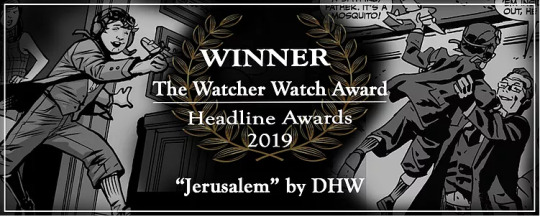
Winner - Jerusalem by DHW
“We fell in love with the rich detail and amazing world-building of this piece. An interesting twist was added by the fact that all this fantastical detail is given through the perspective of Rupert's father telling his skeptical son a story -- leaving room for the possibility that it's all made up (although we can never quite believe that). Rupert's father is a fascinating character and gives us intriguing hints at where Giles may have gotten some of his own personality traits. We also appreciated how well written young Rupert was, especially given that writing children is always tricky. And the subtle yet incredibly well-earned ending of the story was shear genius.”

Runner-up - Metamorphosis by sparrow2000
“This is a throwaway remark in canon spun out into a magical, lush, tense, and fearful moment that draws on ancient pagan archetypes. Giles is a much beloved character and his heroic nature can make it hard to write him as being flawed. But this story delicately hints at doing the right thing by uncomfortable means. With subtlety and skill, the writing hints at his past and what the heady rush of such huge magic could do to his pride and his own personality; putting him emotionally close to the addicted and power-mad Willow even though she’s only a looming presence. The poetic language appeals to all the senses and the brief flashes of what exists in Giles’s deepest subconscious do a better job of establishing an emotional continuity than canon did. There’s true mastery of language and of character here.”
The Twosome of Cuteness Award [Best romance, Giles]
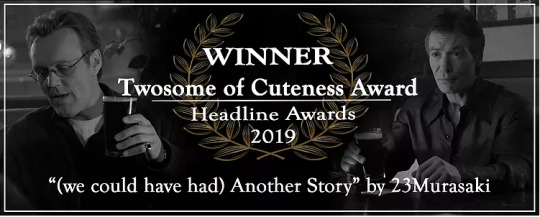
Winner - (we could have had) Another Story by 23Murasaki
“This was a favorite story this year, period. Oh man, it was cool. The circular, many-lives aspect, how each chapter functioned as a stand-alone story, at the same time suggesting a larger, longer story, all related with motifs and emphasis coming back… It was beautifully written. We loved the way magic was handled. We loved the character voices. We loved the non-canon character details that felt so correct (Giles changing his accent to get rid of a stutter. Ethan with a mysterious, complex, changing background…) We could go on and on about this one!”

Runner-up - The Art of Tea by ljs
“So very beautiful and sad. It wears its complex worldbuilding very lightly. We love that this is a story about rituals, which is a very specific, meaningful concept to these specific characters. Even if you don’t ship Anya/Giles normally, this fic will have you convinced. Wonderful characterization, especially of Anya. We love accountant Anya!”
The Good Squirm Award [Best smut, Giles]
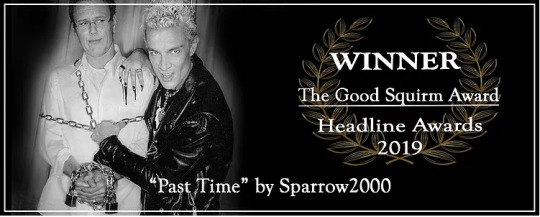
Winner - Past Time by Sparrow2000
“More plot driven than pure lemony goodness, ‘Past Time’ is a deliciously dark look into our favorite Watcher’s state of mind directly leading up to the summoning of Eygon. Well-written and captivating, the author keeps you transfixed as you delve into Ripper’s mental and emotional state until the conclusion to commit the one act that haunts him for the rest of his life is almost foregone. Of course, the lemony goodness is very good 😉 with some references thrown in that will leave Giles and Spike fans alike grinning. Kudos and well done!”

Runner-up - The Clockwork Circuit of the Stars by Snickfic
“Absolutely fantastic! A fresh and beautifully written twist on the sex or die trope. The twist, of course, being very true to the Buffyverse that Giles and Faith do the do or the whole world dies! Beautiful and vivid imagery as well as a very believable reason for this uncommon pairing make this story a definite do not miss!!”
The Dark Age Award [Best dark, Giles]
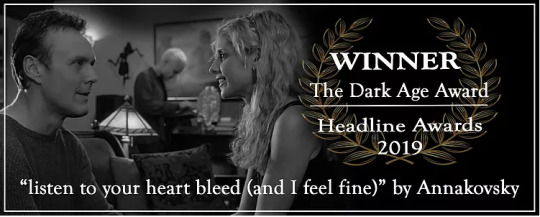
Winner - listen to your heart bleed (and I feel fine) by Annakovsky
“We loved the vivid language which so wonderfully captured the story's settings and themes. As darkfic, you couldn't get much darker, yet the author captured a certain kind of beauty as well. The Giles POV is wonderfully rich and on point right up until the heartrending ending.”

Runner-up - bless her soul by The_Eclectic_Bookworm
“This is an elegant, creepy little horror story that still manages to exist perfectly within the universe of Buffy. It puts a lot of knowledge, and a lot of world-building into making a clever premise – Jenny Calendar gets resurrected – feel like it could be canon. Great characterization across the board, especially with Giles and Jenny herself. It’s exciting, intense, a well-written character study, and will keep you scrolling all the way though.”
The Rather British Award [Best characterization, Giles]

Winner - Gas-Ring Alchemy by Antennapedia
“We loved the flustered young innocence of both Rupert and Ethan in this. Their dialogue is quick and smart, and they're both taking opportunities to show off, just a bit, just as you'd expect between the two of them. When Rupert’s professors hit him and chastised him for being imperfect, he said that the words hurt more than the fists. This seems super in-line with what we know of Giles. The first stirrings of questioning their authority is a perfect hint at later character developments: when he drops out of school as a young man, then when he stands against the Council to protect Buffy in ‘Helpless’. Overall, this is one of our favorite Giles stories, and the characterization very much hit the mark. We’ve adopted the fact that Rupert has a hot cocoa ritual into our personal canons about the character, and the author gave us that gift. Amazing work!”

Runner-up - (we could have had) Another Story by 23Murasaki
“Imaginative facets of Giles as at various ages and various levels of Watcher-ness, all the roads that might have been, plus an it-could-be-my-new-canon ‘official’ version. Loved that there was both an innocent child and an evil version, and every one of them was still a vivid and believable Giles. All six snippets felt well-developed and complete, even though they were short. A fey Ethan is changeable and fascinating to Giles in different ways in each of the stories, in a way that showcases both of them well. Excellent exploration of Giles’ character.”
The You Were the One I Loved Award [Fan favorite, Giles]

Winner - Jerusalem by DHW

Runner-up - Sands of Time by il_mio_capitano
18 notes
·
View notes